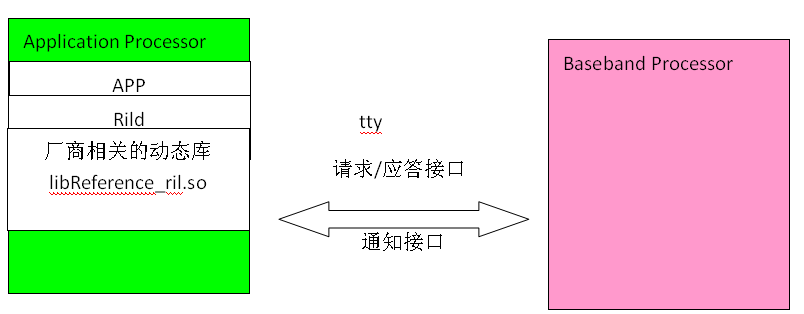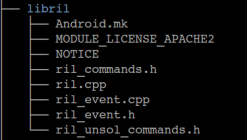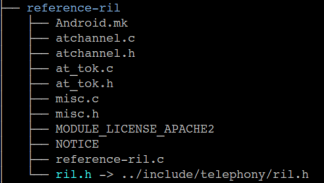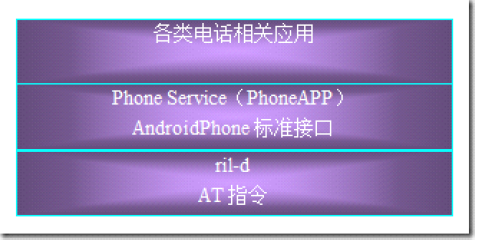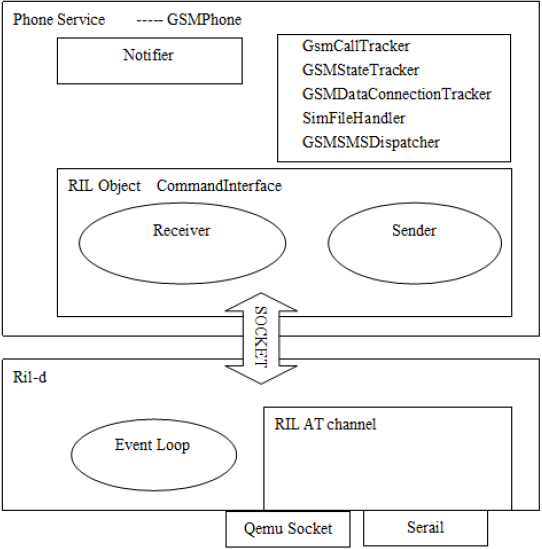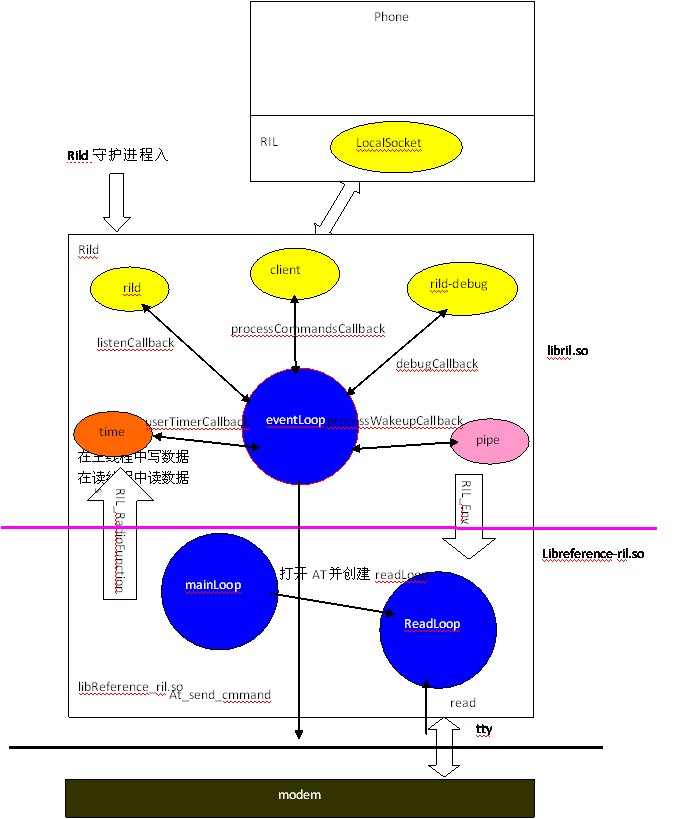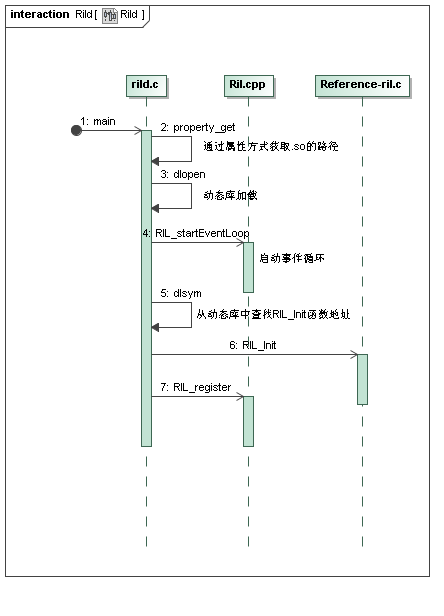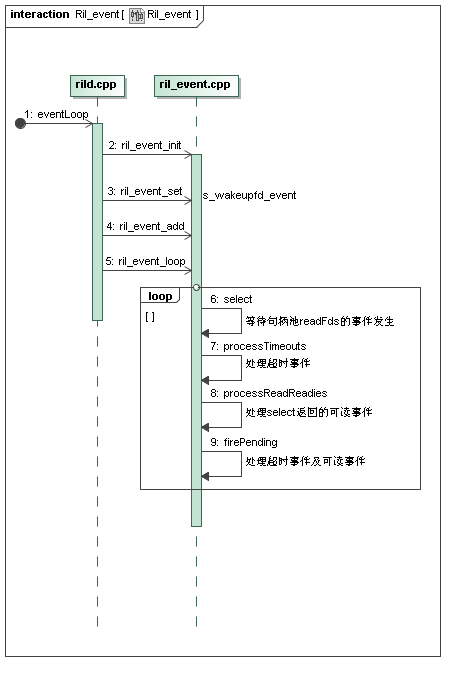本文主要是介绍RIL 机制源码分析,希望对大家解决编程问题提供一定的参考价值,需要的开发者们随着小编来一起学习吧!
Android 电话系统框架介绍
在Android系统中rild运行在AP上,AP上的应用通过rild发送AT指令给BP,BP接收到信息后又通过rild传送给AP。AP与BP之间有两种通信方式:
1.Solicited Response:Ap向Bp发送请求,Bp给Ap发送回复,该类型的AT指令及其回调函数以数组的形式存放在Ril_commands.h文件中:
{数组中的索引号,请求回调函数,响应回调函数}
- {0, NULL, NULL}, //none
- {RIL_REQUEST_GET_SIM_STATUS, dispatchVoid, responseSimStatus},
- {RIL_REQUEST_ENTER_SIM_PIN, dispatchStrings, responseInts},
- {RIL_REQUEST_ENTER_SIM_PUK, dispatchStrings, responseInts},
- {RIL_REQUEST_ENTER_SIM_PIN2, dispatchStrings, responseInts},
- {RIL_REQUEST_ENTER_SIM_PUK2, dispatchStrings, responseInts},
- {RIL_REQUEST_CHANGE_SIM_PIN, dispatchStrings, responseInts},
- {RIL_REQUEST_CHANGE_SIM_PIN2, dispatchStrings, responseInts},
- {RIL_REQUEST_ENTER_NETWORK_DEPERSONALIZATION, dispatchStrings, responseInts},
- {RIL_REQUEST_GET_CURRENT_CALLS, dispatchVoid, responseCallList},
- {RIL_REQUEST_DIAL, dispatchDial, responseVoid},
- {RIL_REQUEST_GET_IMSI, dispatchStrings, responseString},
- {RIL_REQUEST_HANGUP, dispatchInts, responseVoid},
- {RIL_REQUEST_HANGUP_WAITING_OR_BACKGROUND, dispatchVoid, responseVoid},
- ...
{0, NULL, NULL}, //none{RIL_REQUEST_GET_SIM_STATUS, dispatchVoid, responseSimStatus},{RIL_REQUEST_ENTER_SIM_PIN, dispatchStrings, responseInts},{RIL_REQUEST_ENTER_SIM_PUK, dispatchStrings, responseInts},{RIL_REQUEST_ENTER_SIM_PIN2, dispatchStrings, responseInts},{RIL_REQUEST_ENTER_SIM_PUK2, dispatchStrings, responseInts},{RIL_REQUEST_CHANGE_SIM_PIN, dispatchStrings, responseInts},{RIL_REQUEST_CHANGE_SIM_PIN2, dispatchStrings, responseInts},{RIL_REQUEST_ENTER_NETWORK_DEPERSONALIZATION, dispatchStrings, responseInts},{RIL_REQUEST_GET_CURRENT_CALLS, dispatchVoid, responseCallList},{RIL_REQUEST_DIAL, dispatchDial, responseVoid},{RIL_REQUEST_GET_IMSI, dispatchStrings, responseString},{RIL_REQUEST_HANGUP, dispatchInts, responseVoid},{RIL_REQUEST_HANGUP_WAITING_OR_BACKGROUND, dispatchVoid, responseVoid},...不同手机厂商使用的AT命令不完全相同,为了保密,AP与BP之间通过各厂商自己的相关动态库来通信。
RIL模块由rild守护进程、libril.so、librefrence.so三部分组成:
1.rild模块被编译为一个可执行文件,实现一个main函数作为整个ril模块的入口点。在初始化时使用dlopen打开librefrence_ril.so,从中取出并执行RIL_Init函数,得到RIL_RadioFunctions指针,通过RIL_register()函数注册到libril.so库中,其源码结构如下:
2.libril.so是共享库,主要负责同上层的通信工作,接收ril的请求,并传递给librefrence_ril.so,同时将librefrence_ril.so返回的消息送给调用进程,源码结构如下所示:
3.librefrence_ril.so是由各手机厂商自己实现,在rild进程运行中通过dlopen方式加载,主要负责跟modem硬件通信,转换来自libril.so的请求为AT命令,同时监听Modem的反馈信息给libril.so
Android的电话系统主要分为三个部分,Java层的各种电话相关应用,java层的Phone Service,主要为上层提供API,同时与native进行通信,可以看做为电话系统的客户端,native层的电话服务进程RILD,负责为上层提供各种电话功能服务,直接与modem进行交互:
Android电话系统设计框架图:
由于Android 开发者使用的Modem 是不一样的,各种指令格式,初始化序列都可能不一样,所以为了消除这些差别,Android 设计者将ril 做了一个抽象,使用一个虚拟电话的概念,不同modem相关的AT指令或者通信协议编译成相应的动态链接库.so文件,Rild 是具体的AT 指令合成者和应答解析者。
Android电话系统代码结构图:
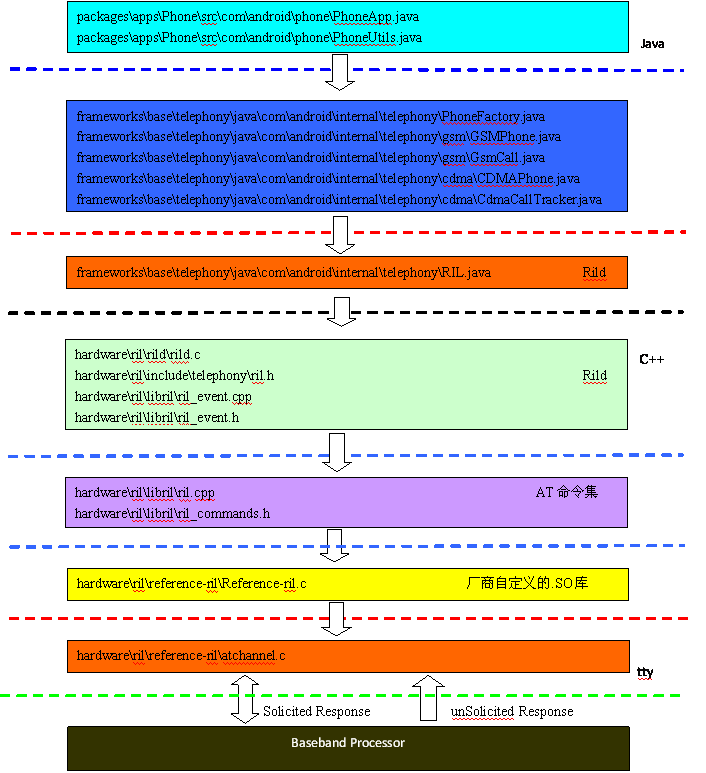
RILD框架设计
在android的电话系统中,在native层实现了电话服务的服务端,由RILD服务与modem的交互,在java层实现电话的客户端,本文主要介绍电话系统的服务端RILD进程,以下是RILD的设计框架图:
RILD源码分析
接下来通过源码对RILD的整个框架进行详细介绍。
在kernel启动完成后,将启动第一个应用进程Init进程,在android之Init进程启动过程源码分析一文中对init进程的启动流程进行了详细的介绍。init进程在启动过程中将读取init.rc文件来启动一些重量级的native服务,rild进程就是通过配置在init.rc中来启动的。
- service ril-daemon /system/bin/rild
- class main
- socket rild stream 660 root radio
- socket rild-debug stream 660 radio system
- user root
- group radio cache inet misc audio sdcard_rw log
service ril-daemon /system/bin/rildclass mainsocket rild stream 660 root radiosocket rild-debug stream 660 radio systemuser rootgroup radio cache inet misc audio sdcard_rw logRILD进程入口函数分析
接下来给出的是RILD进程启动的时序图:
hardware\ril\rild\rild.c
- int main(int argc, charchar **argv)
- {
- const charchar * rilLibPath = NULL;
- charchar **rilArgv;
- voidvoid *dlHandle;
- const RIL_RadioFunctions *(*rilInit)(const struct RIL_Env *, int, charchar **);
- const RIL_RadioFunctions *funcs;
- char libPath[PROPERTY_VALUE_MAX];
- unsigned char hasLibArgs = 0;
- int i;
- umask(S_IRGRP | S_IWGRP | S_IXGRP | S_IROTH | S_IWOTH | S_IXOTH);
- //rild启动无参数
- for (i = 1; i < argc ;) {
- if (0 == strcmp(argv[i], "-l") && (argc - i > 1)) {
- rilLibPath = argv[i + 1];
- i += 2;
- } else if (0 == strcmp(argv[i], "--")) {
- i++;
- hasLibArgs = 1;
- break;
- } else {
- usage(argv[0]);
- }
- }
- if (rilLibPath == NULL) {
- //通过Android属性系统读取属性"rild.libpath"的值,即lib库的存放路径
- if ( 0 == property_get(LIB_PATH_PROPERTY, libPath, NULL)) {
- goto done;
- } else {
- rilLibPath = libPath;
- }
- }
- ##################################################################################
- 判断是否为模拟器
- ##################################################################################
- #if 1
- {
- static char* arg_overrides[3];
- static char arg_device[32];
- int done = 0;
- #define REFERENCE_RIL_PATH "/system/lib/libreference-ril.so"
- /* first, read /proc/cmdline into memory */
- char buffer[1024], *p, *q;
- int len;
- int fd = open("/proc/cmdline",O_RDONLY);
- if (fd < 0) {
- LOGD("could not open /proc/cmdline:%s", strerror(errno));
- goto OpenLib;
- }
- //读取/proc/cmdline文件中的内容
- do {
- len = read(fd,buffer,sizeof(buffer)); }
- while (len == -1 && errno == EINTR);
- if (len < 0) {
- LOGD("could not read /proc/cmdline:%s", strerror(errno));
- close(fd);
- goto OpenLib;
- }
- close(fd);
- //判断是否为模拟器,对于真机,此处条件为false
- if (strstr(buffer, "android.qemud=") != NULL)
- {
- int tries = 5;
- #define QEMUD_SOCKET_NAME "qemud"
- while (1) {
- int fd;
- sleep(1);
- fd = socket_local_client(QEMUD_SOCKET_NAME,
- ANDROID_SOCKET_NAMESPACE_RESERVED,
- SOCK_STREAM );
- if (fd >= 0) {
- close(fd);
- snprintf( arg_device, sizeof(arg_device), "%s/%s",
- ANDROID_SOCKET_DIR, QEMUD_SOCKET_NAME );
- arg_overrides[1] = "-s";
- arg_overrides[2] = arg_device;
- done = 1;
- break;
- }
- LOGD("could not connect to %s socket: %s",QEMUD_SOCKET_NAME, strerror(errno));
- if (--tries == 0)
- break;
- }
- if (!done) {
- LOGE("could not connect to %s socket (giving up): %s",
- QEMUD_SOCKET_NAME, strerror(errno));
- while(1)
- sleep(0x00ffffff);
- }
- }
- /* otherwise, try to see if we passed a device name from the kernel */
- if (!done) do { //true
- #define KERNEL_OPTION "android.ril="
- #define DEV_PREFIX "/dev/"
- //判断/proc/cmdline中的内容是否包含"android.ril="
- p = strstr( buffer, KERNEL_OPTION );
- if (p == NULL)
- break;
- p += sizeof(KERNEL_OPTION)-1;
- q = strpbrk( p, " \t\n\r" );
- if (q != NULL)
- *q = 0;
- snprintf( arg_device, sizeof(arg_device), DEV_PREFIX "%s", p );
- arg_device[sizeof(arg_device)-1] = 0;
- arg_overrides[1] = "-d";
- arg_overrides[2] = arg_device;
- done = 1;
- } while (0);
- if (done) { //false
- argv = arg_overrides;
- argc = 3;
- i = 1;
- hasLibArgs = 1;
- rilLibPath = REFERENCE_RIL_PATH;
- LOGD("overriding with %s %s", arg_overrides[1], arg_overrides[2]);
- }
- }
- OpenLib:
- #endif
- ##################################################################################
- 动态库装载
- ##################################################################################
- switchUser();//设置Rild进程的组用户为radio
- //加载厂商自定义的库
- ①dlHandle = dlopen(rilLibPath, RTLD_NOW);
- if (dlHandle == NULL) {
- fprintf(stderr, "dlopen failed: %s\n", dlerror());
- exit(-1);
- }
- //<span style="font-family:'Courier New';color:#080000;line-height: 1.5; white-space: pre-wrap;">创建客户端事件监听线程</span>
- ②RIL_startEventLoop();
- //<span style="font-family:'Courier New';color:#080000;line-height: 1.5; white-space: pre-wrap;">通过dlsym定位到RIL_Init函数的地址,并且强制转换为RIL_RadioFunctions的函数指针</span>
- ③rilInit = (const RIL_RadioFunctions *(*)(const struct RIL_Env *, int, charchar **))dlsym(dlHandle, "RIL_Init");
- if (rilInit == NULL) {
- fprintf(stderr, "RIL_Init not defined or exported in %s\n", rilLibPath);
- exit(-1);
- }
- if (hasLibArgs) { //false
- rilArgv = argv + i - 1;
- argc = argc -i + 1;
- } else {
- static charchar * newArgv[MAX_LIB_ARGS];
- static char args[PROPERTY_VALUE_MAX];
- rilArgv = newArgv;
- property_get(LIB_ARGS_PROPERTY, args, "");//通过属性系统读取"rild.libargs"属性值
- argc = make_argv(args, rilArgv);
- }
- // Make sure there's a reasonable argv[0]
- rilArgv[0] = argv[0];
- //调用RIL_Init函数来初始化rild,传入参数s_rilEnv,返回RIL_RadioFunctions地址
- ④funcs = rilInit(&s_rilEnv, argc, rilArgv);
- //<span style="font-family:'Courier New';color:#080000;line-height: 1.5; white-space: pre-wrap;">注册客户端事件处理接口</span><span style="font-family:'Courier New';color:#080000;line-height: 1.5; white-space: pre-wrap;">RIL_RadioFunctions</span><span style="font-family:'Courier New';color:#080000;line-height: 1.5; white-space: pre-wrap;">,并创建socket监听事件</span>
- ⑤RIL_register(funcs);
- done:
- while(1) {
- // sleep(UINT32_MAX) seems to return immediately on bionic
- sleep(0x00ffffff);
- }
- }
int main(int argc, char **argv)
{const char * rilLibPath = NULL;char **rilArgv;void *dlHandle;const RIL_RadioFunctions *(*rilInit)(const struct RIL_Env *, int, char **);const RIL_RadioFunctions *funcs;char libPath[PROPERTY_VALUE_MAX];unsigned char hasLibArgs = 0;int i;umask(S_IRGRP | S_IWGRP | S_IXGRP | S_IROTH | S_IWOTH | S_IXOTH);//rild启动无参数for (i = 1; i < argc ;) {if (0 == strcmp(argv[i], "-l") && (argc - i > 1)) {rilLibPath = argv[i + 1];i += 2;} else if (0 == strcmp(argv[i], "--")) {i++;hasLibArgs = 1;break;} else {usage(argv[0]);}}if (rilLibPath == NULL) {//通过Android属性系统读取属性"rild.libpath"的值,即lib库的存放路径if ( 0 == property_get(LIB_PATH_PROPERTY, libPath, NULL)) {goto done;} else {rilLibPath = libPath;}}
##################################################################################判断是否为模拟器
##################################################################################
#if 1{static char* arg_overrides[3];static char arg_device[32];int done = 0;
#define REFERENCE_RIL_PATH "/system/lib/libreference-ril.so"/* first, read /proc/cmdline into memory */char buffer[1024], *p, *q;int len;int fd = open("/proc/cmdline",O_RDONLY);if (fd < 0) {LOGD("could not open /proc/cmdline:%s", strerror(errno));goto OpenLib;}//读取/proc/cmdline文件中的内容do {len = read(fd,buffer,sizeof(buffer)); }while (len == -1 && errno == EINTR);if (len < 0) {LOGD("could not read /proc/cmdline:%s", strerror(errno));close(fd);goto OpenLib;}close(fd);//判断是否为模拟器,对于真机,此处条件为falseif (strstr(buffer, "android.qemud=") != NULL){int tries = 5;
#define QEMUD_SOCKET_NAME "qemud"while (1) {int fd;sleep(1);fd = socket_local_client(QEMUD_SOCKET_NAME,ANDROID_SOCKET_NAMESPACE_RESERVED,SOCK_STREAM );if (fd >= 0) {close(fd);snprintf( arg_device, sizeof(arg_device), "%s/%s",ANDROID_SOCKET_DIR, QEMUD_SOCKET_NAME );arg_overrides[1] = "-s";arg_overrides[2] = arg_device;done = 1;break;}LOGD("could not connect to %s socket: %s",QEMUD_SOCKET_NAME, strerror(errno));if (--tries == 0)break;}if (!done) {LOGE("could not connect to %s socket (giving up): %s",QEMUD_SOCKET_NAME, strerror(errno));while(1)sleep(0x00ffffff);}}/* otherwise, try to see if we passed a device name from the kernel */if (!done) do { //true
#define KERNEL_OPTION "android.ril="
#define DEV_PREFIX "/dev/"//判断/proc/cmdline中的内容是否包含"android.ril="p = strstr( buffer, KERNEL_OPTION );if (p == NULL)break;p += sizeof(KERNEL_OPTION)-1;q = strpbrk( p, " \t\n\r" );if (q != NULL)*q = 0;snprintf( arg_device, sizeof(arg_device), DEV_PREFIX "%s", p );arg_device[sizeof(arg_device)-1] = 0;arg_overrides[1] = "-d";arg_overrides[2] = arg_device;done = 1;} while (0);if (done) { //falseargv = arg_overrides;argc = 3;i = 1;hasLibArgs = 1;rilLibPath = REFERENCE_RIL_PATH;LOGD("overriding with %s %s", arg_overrides[1], arg_overrides[2]);}}
OpenLib:
#endif
##################################################################################动态库装载
##################################################################################switchUser();//设置Rild进程的组用户为radio//加载厂商自定义的库①dlHandle = dlopen(rilLibPath, RTLD_NOW);if (dlHandle == NULL) {fprintf(stderr, "dlopen failed: %s\n", dlerror());exit(-1);}//<span style="font-family:'Courier New';color:#080000;line-height: 1.5; white-space: pre-wrap;">创建客户端事件监听线程</span>②RIL_startEventLoop();//<span style="font-family:'Courier New';color:#080000;line-height: 1.5; white-space: pre-wrap;">通过dlsym定位到RIL_Init函数的地址,并且强制转换为RIL_RadioFunctions的函数指针</span>③rilInit = (const RIL_RadioFunctions *(*)(const struct RIL_Env *, int, char **))dlsym(dlHandle, "RIL_Init");if (rilInit == NULL) {fprintf(stderr, "RIL_Init not defined or exported in %s\n", rilLibPath);exit(-1);}if (hasLibArgs) { //falserilArgv = argv + i - 1;argc = argc -i + 1;} else {static char * newArgv[MAX_LIB_ARGS];static char args[PROPERTY_VALUE_MAX];rilArgv = newArgv;property_get(LIB_ARGS_PROPERTY, args, "");//通过属性系统读取"rild.libargs"属性值argc = make_argv(args, rilArgv);}// Make sure there's a reasonable argv[0]rilArgv[0] = argv[0];//调用RIL_Init函数来初始化rild,传入参数s_rilEnv,返回RIL_RadioFunctions地址④funcs = rilInit(&s_rilEnv, argc, rilArgv);//<span style="font-family:'Courier New';color:#080000;line-height: 1.5; white-space: pre-wrap;">注册客户端事件处理接口</span><span style="font-family:'Courier New';color:#080000;line-height: 1.5; white-space: pre-wrap;">RIL_RadioFunctions</span><span style="font-family:'Courier New';color:#080000;line-height: 1.5; white-space: pre-wrap;">,并创建socket监听事件</span>⑤RIL_register(funcs);
done:while(1) {// sleep(UINT32_MAX) seems to return immediately on bionicsleep(0x00ffffff);}
}1.解析命令行参数,通过判断是否为模拟器采取不同的方式来读取libreference-ril.so库的存放路径;
2.使用dlopen手动装载libreference-ril.so库;
3.启动事件循环处理;
4.从libreference-ril.so库中取得RIL_Init函数地址,并使用该函数将libril.so库中的RIL_Env接口注册到libreference-ril.so库,同时将libreference-ril.so库中的RIL_RadioFunctions接口注册到到libril.so库中,建立起libril.so库与libreference-ril.so库通信桥梁;
启动事件循环处理eventLoop工作线程
建立多路I/O驱动机制的消息队列,用来接收上层发出的命令以及往Modem发送AT指令的工作,时整个RIL系统的核心部分。创建一个事件分发线程s_tid_dispatch,线程执行体为eventLoop。
hardware\ril\libril\Ril.cpp
- extern "C" void RIL_startEventLoop(void) {
- int ret;
- pthread_attr_t attr;
- /* spin up eventLoop thread and wait for it to get started */
- s_started = 0;
- pthread_mutex_lock(&s_startupMutex);
- pthread_attr_init (&attr);
- pthread_attr_setdetachstate(&attr, PTHREAD_CREATE_DETACHED);
- //创建一个工作线程eventLoop
- ret = pthread_create(&s_tid_dispatch, &attr, eventLoop, NULL);
- //确保函数返回前eventLoop线程启动运行
- while (s_started == 0) {
- pthread_cond_wait(&s_startupCond, &s_startupMutex);
- }
- pthread_mutex_unlock(&s_startupMutex);
- if (ret < 0) {
- LOGE("Failed to create dispatch thread errno:%d", errno);
- return;
- }
- }
extern "C" void RIL_startEventLoop(void) {int ret;pthread_attr_t attr;/* spin up eventLoop thread and wait for it to get started */s_started = 0;pthread_mutex_lock(&s_startupMutex);pthread_attr_init (&attr);pthread_attr_setdetachstate(&attr, PTHREAD_CREATE_DETACHED);//创建一个工作线程eventLoopret = pthread_create(&s_tid_dispatch, &attr, eventLoop, NULL);//确保函数返回前eventLoop线程启动运行while (s_started == 0) {pthread_cond_wait(&s_startupCond, &s_startupMutex);}pthread_mutex_unlock(&s_startupMutex);if (ret < 0) {LOGE("Failed to create dispatch thread errno:%d", errno);return;}
}
2. Wakeup事件:这些事件的句柄fd将加入的select IO多路复用的句柄池readFDs中,当对应的fd可读时将触发这些事件。对于处于listen端的socket,fd可读表示有个客户端连接,此时需要调用accept接受连接。
事件定义如下:- struct ril_event {
- struct ril_event *next;
- struct ril_event *prev;
- int fd; //文件句柄
- int index; //该事件在监控表中的索引
- bool persist; //如果是保持的,则不从watch_list 中删除
- struct timeval timeout; //任务执行时间
- ril_event_cb func; //回调事件处理函数
- void *param; //回调时参数
- };
struct ril_event {struct ril_event *next;struct ril_event *prev;int fd; //文件句柄int index; //该事件在监控表中的索引 bool persist; //如果是保持的,则不从watch_list 中删除struct timeval timeout; //任务执行时间ril_event_cb func; //回调事件处理函数void *param; //回调时参数
};在Rild进程中的几个重要事件有
- static struct ril_event s_commands_event;
- ril_event_set (&s_commands_event, s_fdCommand, 1,processCommandsCallback, p_rs)
- static struct ril_event s_wakeupfd_event;
- ril_event_set (&s_wakeupfd_event, s_fdWakeupRead, true,processWakeupCallback, NULL)
- static struct ril_event s_listen_event;
- ril_event_set (&s_listen_event, s_fdListen, false,listenCallback, NULL)
- static struct ril_event s_wake_timeout_event;
- ril_timer_add(&(p_info->event), &myRelativeTime);
- static struct ril_event s_debug_event;
- ril_event_set (&s_debug_event, s_fdDebug, true,debugCallback, NULL)
static struct ril_event s_commands_event;
ril_event_set (&s_commands_event, s_fdCommand, 1,processCommandsCallback, p_rs)static struct ril_event s_wakeupfd_event;
ril_event_set (&s_wakeupfd_event, s_fdWakeupRead, true,processWakeupCallback, NULL)static struct ril_event s_listen_event;
ril_event_set (&s_listen_event, s_fdListen, false,listenCallback, NULL)static struct ril_event s_wake_timeout_event;
ril_timer_add(&(p_info->event), &myRelativeTime);static struct ril_event s_debug_event;
ril_event_set (&s_debug_event, s_fdDebug, true,debugCallback, NULL)/事件监控队列
static struct ril_event * watch_table[MAX_FD_EVENTS];
//定时事件队列
static struct ril_event timer_list;
//处理事件队列
static struct ril_event pending_list; //待处理事件队列,事件已经触发,需要所回调处理的事件

添加事件
- static void rilEventAddWakeup(struct ril_event *ev) {
- ril_event_add(ev); //向监控表watch_table添加一个s_wakeupfd_event事件
- triggerEvLoop(); //向管道s_fdWakeupWrite中写入之来触发事件循环
- }
static void rilEventAddWakeup(struct ril_event *ev) {ril_event_add(ev); //向监控表watch_table添加一个s_wakeupfd_event事件triggerEvLoop(); //向管道s_fdWakeupWrite中写入之来触发事件循环
}- void ril_event_add(struct ril_event * ev)
- {
- dlog("~~~~ +ril_event_add ~~~~");
- MUTEX_ACQUIRE();
- for (int i = 0; i < MAX_FD_EVENTS; i++) { //遍历监控表watch_table
- if (watch_table[i] == NULL) { //从监控表中查找空闲的索引,然后把该任务加入到监控表中
- watch_table[i] = ev; //向监控表中添加事件
- ev->index = i; //事件的索引设置为在监控表中的索引
- dlog("~~~~ added at %d ~~~~", i);
- dump_event(ev);
- FD_SET(ev->fd, &readFds); //将添加的事件对应的句柄添加到句柄池readFds中
- if (ev->fd >= nfds) nfds = ev->fd+1; //修改句柄最大值
- dlog("~~~~ nfds = %d ~~~~", nfds);
- break;
- }
- }
- MUTEX_RELEASE();
- dlog("~~~~ -ril_event_add ~~~~");
- }
void ril_event_add(struct ril_event * ev)
{dlog("~~~~ +ril_event_add ~~~~");MUTEX_ACQUIRE();for (int i = 0; i < MAX_FD_EVENTS; i++) { //遍历监控表watch_tableif (watch_table[i] == NULL) { //从监控表中查找空闲的索引,然后把该任务加入到监控表中watch_table[i] = ev; //向监控表中添加事件ev->index = i; //事件的索引设置为在监控表中的索引dlog("~~~~ added at %d ~~~~", i);dump_event(ev);FD_SET(ev->fd, &readFds); //将添加的事件对应的句柄添加到句柄池readFds中if (ev->fd >= nfds) nfds = ev->fd+1; //修改句柄最大值dlog("~~~~ nfds = %d ~~~~", nfds);break;}}MUTEX_RELEASE();dlog("~~~~ -ril_event_add ~~~~");
}2.添加定时事件
- static void triggerEvLoop() {
- int ret;
- if (!pthread_equal(pthread_self(), s_tid_dispatch)) { //如果当前线程ID不等于事件分发线程eventLoop的线程ID
- do {
- ret = write (s_fdWakeupWrite, " ", 1); //向管道写端写入值1来触发eventLoop事件循环
- } while (ret < 0 && errno == EINTR);
- }
- }
- void ril_event_loop()
- {
- int n;
- fd_set rfds;
- struct timeval tv;
- struct timeval * ptv;
- for (;;) {
- memcpy(&rfds, &readFds, sizeof(fd_set));
- if (-1 == calcNextTimeout(&tv)) {
- dlog("~~~~ no timers; blocking indefinitely ~~~~");
- ptv = NULL;
- } else {
- dlog("~~~~ blocking for %ds + %dus ~~~~", (int)tv.tv_sec, (int)tv.tv_usec);
- ptv = &tv;
- }
- //使用select 函数等待在FDS 上,只要FDS 中记录的设备有数据到来,select 就会设置相应的标志位并返回。readFDS 记录了所有的事件相关设备句柄。readFDS 中句柄是在在AddEvent 加入的。
- printReadies(&rfds);
- n = select(nfds, &rfds, NULL, NULL, ptv);
- printReadies(&rfds);
- dlog("~~~~ %d events fired ~~~~", n);
- if (n < 0) {
- if (errno == EINTR) continue;
- LOGE("ril_event: select error (%d)", errno);
- return;
- }
- processTimeouts(); //从timer_list中查询执行时间已到的事件,并添加到pending_list中
- processReadReadies(&rfds, n); //从watch_table中查询数据可读的事件,并添加到pending_list中去处理,如果该事件不是持久事件,则同时从watch_table中删除
- //遍历pending_list,调用事件处理回调函数处理所有事件
- firePending();
- }
- }
void ril_event_loop()
{int n;fd_set rfds;struct timeval tv;struct timeval * ptv;for (;;) {memcpy(&rfds, &readFds, sizeof(fd_set));if (-1 == calcNextTimeout(&tv)) {dlog("~~~~ no timers; blocking indefinitely ~~~~");ptv = NULL;} else {dlog("~~~~ blocking for %ds + %dus ~~~~", (int)tv.tv_sec, (int)tv.tv_usec);ptv = &tv;}//使用select 函数等待在FDS 上,只要FDS 中记录的设备有数据到来,select 就会设置相应的标志位并返回。readFDS 记录了所有的事件相关设备句柄。readFDS 中句柄是在在AddEvent 加入的。printReadies(&rfds);n = select(nfds, &rfds, NULL, NULL, ptv); printReadies(&rfds);dlog("~~~~ %d events fired ~~~~", n);if (n < 0) {if (errno == EINTR) continue;LOGE("ril_event: select error (%d)", errno);return;}processTimeouts(); //从timer_list中查询执行时间已到的事件,并添加到pending_list中processReadReadies(&rfds, n); //从watch_table中查询数据可读的事件,并添加到pending_list中去处理,如果该事件不是持久事件,则同时从watch_table中删除//遍历pending_list,调用事件处理回调函数处理所有事件firePending();}
}
1.超时事件查询
- static void processTimeouts()
- {
- dlog("~~~~ +processTimeouts ~~~~");
- MUTEX_ACQUIRE();
- struct timeval now;
- struct ril_event * tev = timer_list.next;
- struct ril_event * next;
- getNow(&now); //获取当前时间
- dlog("~~~~ Looking for timers <= %ds + %dus ~~~~", (int)now.tv_sec, (int)now.tv_usec);
- //如果当前时间大于事件的超时时间,则将该事件从timer_list中移除,添加到pending_list
- while ((tev != &timer_list) && (timercmp(&now, &tev->timeout, >))) {
- dlog("~~~~ firing timer ~~~~");
- next = tev->next;
- removeFromList(tev); //从timer_list中移除事件
- addToList(tev, &pending_list); //将事件添加到pending_list
- tev = next;
- }
- MUTEX_RELEASE();
- dlog("~~~~ -processTimeouts ~~~~");
- }
static void processTimeouts()
{dlog("~~~~ +processTimeouts ~~~~");MUTEX_ACQUIRE();struct timeval now;struct ril_event * tev = timer_list.next;struct ril_event * next;getNow(&now); //获取当前时间dlog("~~~~ Looking for timers <= %ds + %dus ~~~~", (int)now.tv_sec, (int)now.tv_usec);//如果当前时间大于事件的超时时间,则将该事件从timer_list中移除,添加到pending_listwhile ((tev != &timer_list) && (timercmp(&now, &tev->timeout, >))) {dlog("~~~~ firing timer ~~~~");next = tev->next;removeFromList(tev); //从timer_list中移除事件addToList(tev, &pending_list); //将事件添加到pending_listtev = next;}MUTEX_RELEASE();dlog("~~~~ -processTimeouts ~~~~");
}- static void processReadReadies(fd_set * rfds, int n)
- {
- dlog("~~~~ +processReadReadies (%d) ~~~~", n);
- MUTEX_ACQUIRE();
- //遍历watch_table数组,根据select返回的句柄n查找对应的事件
- for (int i = 0; (i < MAX_FD_EVENTS) && (n > 0); i++) {
- struct ril_event * rev = watch_table[i]; //得到相应的事件
- if (rev != NULL && FD_ISSET(rev->fd, rfds)) {
- addToList(rev, &pending_list); //将该事件添加到pending_list中
- if (rev->persist == false) { //如果该事件不是持久事件还要从watch_table中移除
- removeWatch(rev, i);
- }
- n--;
- }
- }
- MUTEX_RELEASE();
- dlog("~~~~ -processReadReadies (%d) ~~~~", n);
- }
static void processReadReadies(fd_set * rfds, int n)
{dlog("~~~~ +processReadReadies (%d) ~~~~", n);MUTEX_ACQUIRE(); //遍历watch_table数组,根据select返回的句柄n查找对应的事件for (int i = 0; (i < MAX_FD_EVENTS) && (n > 0); i++) {struct ril_event * rev = watch_table[i]; //得到相应的事件if (rev != NULL && FD_ISSET(rev->fd, rfds)) {addToList(rev, &pending_list); //将该事件添加到pending_list中if (rev->persist == false) { //如果该事件不是持久事件还要从watch_table中移除removeWatch(rev, i);}n--;}}MUTEX_RELEASE();dlog("~~~~ -processReadReadies (%d) ~~~~", n);
}- static void firePending()
- {
- dlog("~~~~ +firePending ~~~~");
- struct ril_event * ev = pending_list.next;
- while (ev != &pending_list) { //遍历pending_list链表,处理链表中的所有事件
- struct ril_event * next = ev->next;
- removeFromList(ev); //将处理完的事件从pending_list中移除
- ev->func(ev->fd, 0, ev->param); //调用事件处理的回调函数
- ev = next;
- }
- dlog("~~~~ -firePending ~~~~");
- }
static void firePending()
{dlog("~~~~ +firePending ~~~~");struct ril_event * ev = pending_list.next;while (ev != &pending_list) { //遍历pending_list链表,处理链表中的所有事件struct ril_event * next = ev->next;removeFromList(ev); //将处理完的事件从pending_list中移除ev->func(ev->fd, 0, ev->param); //调用事件处理的回调函数ev = next;}dlog("~~~~ -firePending ~~~~");
}hardware\ril\include\telephony\ril.h
- struct RIL_Env {
- //动态库完成请求后通知处理结果的接口
- void (*OnRequestComplete)(RIL_Token t, RIL_Errno e,void *response, size_t responselen);
- //动态库unSolicited Response通知接口
- void (*OnUnsolicitedResponse)(int unsolResponse, const void *data,size_t datalen);
- //向Rild提交一个超时任务的接口
- void (*RequestTimedCallback) (RIL_TimedCallback callback,void *param, const struct timeval *relativeTime);
- };
struct RIL_Env {//动态库完成请求后通知处理结果的接口void (*OnRequestComplete)(RIL_Token t, RIL_Errno e,void *response, size_t responselen);//动态库unSolicited Response通知接口void (*OnUnsolicitedResponse)(int unsolResponse, const void *data,size_t datalen);//向Rild提交一个超时任务的接口void (*RequestTimedCallback) (RIL_TimedCallback callback,void *param, const struct timeval *relativeTime);
};s_rilEnv变量定义:
- static struct RIL_Env s_rilEnv = {
- RIL_onRequestComplete,
- RIL_onUnsolicitedResponse,
- RIL_requestTimedCallback
- };
static struct RIL_Env s_rilEnv = {RIL_onRequestComplete,RIL_onUnsolicitedResponse,RIL_requestTimedCallback
};1.RIL_onRequestComplete
- extern "C" void RIL_onRequestComplete(RIL_Token t, RIL_Errno e, void *response, size_t responselen) {
- RequestInfo *pRI;
- int ret;
- size_t errorOffset;
- pRI = (RequestInfo *)t;
- if (!checkAndDequeueRequestInfo(pRI)) {
- LOGE ("RIL_onRequestComplete: invalid RIL_Token");
- return;
- }
- if (pRI->local > 0) {
- // Locally issued command...void only!
- // response does not go back up the command socket
- LOGD("C[locl]< %s", requestToString(pRI->pCI->requestNumber));
- goto done;
- }
- appendPrintBuf("[%04d]< %s",pRI->token, requestToString(pRI->pCI->requestNumber));
- if (pRI->cancelled == 0) {
- Parcel p;
- p.writeInt32 (RESPONSE_SOLICITED);
- p.writeInt32 (pRI->token);
- errorOffset = p.dataPosition();
- p.writeInt32 (e);
- if (response != NULL) {
- // there is a response payload, no matter success or not.
- ret = pRI->pCI->responseFunction(p, response, responselen);
- /* if an error occurred, rewind and mark it */
- if (ret != 0) {
- p.setDataPosition(errorOffset);
- p.writeInt32 (ret);
- }
- }
- if (e != RIL_E_SUCCESS) {
- appendPrintBuf("%s fails by %s", printBuf, failCauseToString(e));
- }
- if (s_fdCommand < 0) {
- LOGD ("RIL onRequestComplete: Command channel closed");
- }
- sendResponse(p);
- }
- done:
- free(pRI);
- }
extern "C" void RIL_onRequestComplete(RIL_Token t, RIL_Errno e, void *response, size_t responselen) {RequestInfo *pRI;int ret;size_t errorOffset;pRI = (RequestInfo *)t;if (!checkAndDequeueRequestInfo(pRI)) {LOGE ("RIL_onRequestComplete: invalid RIL_Token");return;}if (pRI->local > 0) {// Locally issued command...void only!// response does not go back up the command socketLOGD("C[locl]< %s", requestToString(pRI->pCI->requestNumber));goto done;}appendPrintBuf("[%04d]< %s",pRI->token, requestToString(pRI->pCI->requestNumber));if (pRI->cancelled == 0) {Parcel p;p.writeInt32 (RESPONSE_SOLICITED);p.writeInt32 (pRI->token);errorOffset = p.dataPosition();p.writeInt32 (e);if (response != NULL) {// there is a response payload, no matter success or not.ret = pRI->pCI->responseFunction(p, response, responselen);/* if an error occurred, rewind and mark it */if (ret != 0) {p.setDataPosition(errorOffset);p.writeInt32 (ret);}}if (e != RIL_E_SUCCESS) {appendPrintBuf("%s fails by %s", printBuf, failCauseToString(e));}if (s_fdCommand < 0) {LOGD ("RIL onRequestComplete: Command channel closed");}sendResponse(p);}
done:free(pRI);
}通过调用responseXXX将底层响应传给客户进程
2.RIL_onUnsolicitedResponse
- extern "C" void RIL_onUnsolicitedResponse(int unsolResponse, void *data,
- size_t datalen)
- {
- int unsolResponseIndex;
- int ret;
- int64_t timeReceived = 0;
- bool shouldScheduleTimeout = false;
- if (s_registerCalled == 0) {
- // Ignore RIL_onUnsolicitedResponse before RIL_register
- LOGW("RIL_onUnsolicitedResponse called before RIL_register");
- return;
- }
- unsolResponseIndex = unsolResponse - RIL_UNSOL_RESPONSE_BASE;
- if ((unsolResponseIndex < 0)
- || (unsolResponseIndex >= (int32_t)NUM_ELEMS(s_unsolResponses))) {
- LOGE("unsupported unsolicited response code %d", unsolResponse);
- return;
- }
- // Grab a wake lock if needed for this reponse,
- // as we exit we'll either release it immediately
- // or set a timer to release it later.
- switch (s_unsolResponses[unsolResponseIndex].wakeType) {
- case WAKE_PARTIAL:
- grabPartialWakeLock();
- shouldScheduleTimeout = true;
- break;
- case DONT_WAKE:
- default:
- // No wake lock is grabed so don't set timeout
- shouldScheduleTimeout = false;
- break;
- }
- // Mark the time this was received, doing this
- // after grabing the wakelock incase getting
- // the elapsedRealTime might cause us to goto
- // sleep.
- if (unsolResponse == RIL_UNSOL_NITZ_TIME_RECEIVED) {
- timeReceived = elapsedRealtime();
- }
- appendPrintBuf("[UNSL]< %s", requestToString(unsolResponse));
- Parcel p;
- p.writeInt32 (RESPONSE_UNSOLICITED);
- p.writeInt32 (unsolResponse);
- ret = s_unsolResponses[unsolResponseIndex].responseFunction(p, data, datalen);
- if (ret != 0) {
- // Problem with the response. Don't continue;
- goto error_exit;
- }
- // some things get more payload
- switch(unsolResponse) {
- case RIL_UNSOL_RESPONSE_RADIO_STATE_CHANGED:
- p.writeInt32(s_callbacks.onStateRequest());
- appendPrintBuf("%s {%s}", printBuf,
- radioStateToString(s_callbacks.onStateRequest()));
- break;
- case RIL_UNSOL_NITZ_TIME_RECEIVED:
- // Store the time that this was received so the
- // handler of this message can account for
- // the time it takes to arrive and process. In
- // particular the system has been known to sleep
- // before this message can be processed.
- p.writeInt64(timeReceived);
- break;
- }
- ret = sendResponse(p);
- if (ret != 0 && unsolResponse == RIL_UNSOL_NITZ_TIME_RECEIVED) {
- // Unfortunately, NITZ time is not poll/update like everything
- // else in the system. So, if the upstream client isn't connected,
- // keep a copy of the last NITZ response (with receive time noted
- // above) around so we can deliver it when it is connected
- if (s_lastNITZTimeData != NULL) {
- free (s_lastNITZTimeData);
- s_lastNITZTimeData = NULL;
- }
- s_lastNITZTimeData = malloc(p.dataSize());
- s_lastNITZTimeDataSize = p.dataSize();
- memcpy(s_lastNITZTimeData, p.data(), p.dataSize());
- }
- // For now, we automatically go back to sleep after TIMEVAL_WAKE_TIMEOUT
- // FIXME The java code should handshake here to release wake lock
- if (shouldScheduleTimeout) {
- // Cancel the previous request
- if (s_last_wake_timeout_info != NULL) {
- s_last_wake_timeout_info->userParam = (void *)1;
- }
- s_last_wake_timeout_info= internalRequestTimedCallback(wakeTimeoutCallback, NULL,
- &TIMEVAL_WAKE_TIMEOUT);
- }
- return;
- error_exit:
- if (shouldScheduleTimeout) {
- releaseWakeLock();
- }
- }
extern "C" void RIL_onUnsolicitedResponse(int unsolResponse, void *data,size_t datalen)
{int unsolResponseIndex;int ret;int64_t timeReceived = 0;bool shouldScheduleTimeout = false;if (s_registerCalled == 0) {// Ignore RIL_onUnsolicitedResponse before RIL_registerLOGW("RIL_onUnsolicitedResponse called before RIL_register");return;}unsolResponseIndex = unsolResponse - RIL_UNSOL_RESPONSE_BASE;if ((unsolResponseIndex < 0)|| (unsolResponseIndex >= (int32_t)NUM_ELEMS(s_unsolResponses))) {LOGE("unsupported unsolicited response code %d", unsolResponse);return;}// Grab a wake lock if needed for this reponse,// as we exit we'll either release it immediately// or set a timer to release it later.switch (s_unsolResponses[unsolResponseIndex].wakeType) {case WAKE_PARTIAL:grabPartialWakeLock();shouldScheduleTimeout = true;break;case DONT_WAKE:default:// No wake lock is grabed so don't set timeoutshouldScheduleTimeout = false;break;}// Mark the time this was received, doing this// after grabing the wakelock incase getting// the elapsedRealTime might cause us to goto// sleep.if (unsolResponse == RIL_UNSOL_NITZ_TIME_RECEIVED) {timeReceived = elapsedRealtime();}appendPrintBuf("[UNSL]< %s", requestToString(unsolResponse));Parcel p;p.writeInt32 (RESPONSE_UNSOLICITED);p.writeInt32 (unsolResponse);ret = s_unsolResponses[unsolResponseIndex].responseFunction(p, data, datalen);if (ret != 0) {// Problem with the response. Don't continue;goto error_exit;}// some things get more payloadswitch(unsolResponse) {case RIL_UNSOL_RESPONSE_RADIO_STATE_CHANGED:p.writeInt32(s_callbacks.onStateRequest());appendPrintBuf("%s {%s}", printBuf,radioStateToString(s_callbacks.onStateRequest()));break;case RIL_UNSOL_NITZ_TIME_RECEIVED:// Store the time that this was received so the// handler of this message can account for// the time it takes to arrive and process. In// particular the system has been known to sleep// before this message can be processed.p.writeInt64(timeReceived);break;}ret = sendResponse(p);if (ret != 0 && unsolResponse == RIL_UNSOL_NITZ_TIME_RECEIVED) {// Unfortunately, NITZ time is not poll/update like everything// else in the system. So, if the upstream client isn't connected,// keep a copy of the last NITZ response (with receive time noted// above) around so we can deliver it when it is connectedif (s_lastNITZTimeData != NULL) {free (s_lastNITZTimeData);s_lastNITZTimeData = NULL;}s_lastNITZTimeData = malloc(p.dataSize());s_lastNITZTimeDataSize = p.dataSize();memcpy(s_lastNITZTimeData, p.data(), p.dataSize());}// For now, we automatically go back to sleep after TIMEVAL_WAKE_TIMEOUT// FIXME The java code should handshake here to release wake lockif (shouldScheduleTimeout) {// Cancel the previous requestif (s_last_wake_timeout_info != NULL) {s_last_wake_timeout_info->userParam = (void *)1;}s_last_wake_timeout_info= internalRequestTimedCallback(wakeTimeoutCallback, NULL,&TIMEVAL_WAKE_TIMEOUT);}return;
error_exit:if (shouldScheduleTimeout) {releaseWakeLock();}
}3.RIL_requestTimedCallback
- extern "C" void RIL_requestTimedCallback (RIL_TimedCallback callback, void *param,
- const struct timeval *relativeTime) {
- internalRequestTimedCallback (callback, param, relativeTime);
- }
extern "C" void RIL_requestTimedCallback (RIL_TimedCallback callback, void *param,const struct timeval *relativeTime) {internalRequestTimedCallback (callback, param, relativeTime);
}- static UserCallbackInfo *internalRequestTimedCallback (RIL_TimedCallback callback, void *param,
- const struct timeval *relativeTime)
- {
- struct timeval myRelativeTime;
- UserCallbackInfo *p_info;
- p_info = (UserCallbackInfo *) malloc (sizeof(UserCallbackInfo));
- p_info->p_callback = callback;
- p_info->userParam = param;
- if (relativeTime == NULL) {
- /* treat null parameter as a 0 relative time */
- memset (&myRelativeTime, 0, sizeof(myRelativeTime));
- } else {
- /* FIXME I think event_add's tv param is really const anyway */
- memcpy (&myRelativeTime, relativeTime, sizeof(myRelativeTime));
- }
- ril_event_set(&(p_info->event), -1, false, userTimerCallback, p_info);
- ril_timer_add(&(p_info->event), &myRelativeTime);
- triggerEvLoop();
- return p_info;
- }
static UserCallbackInfo *internalRequestTimedCallback (RIL_TimedCallback callback, void *param,const struct timeval *relativeTime)
{struct timeval myRelativeTime;UserCallbackInfo *p_info;p_info = (UserCallbackInfo *) malloc (sizeof(UserCallbackInfo));p_info->p_callback = callback;p_info->userParam = param;if (relativeTime == NULL) {/* treat null parameter as a 0 relative time */memset (&myRelativeTime, 0, sizeof(myRelativeTime));} else {/* FIXME I think event_add's tv param is really const anyway */memcpy (&myRelativeTime, relativeTime, sizeof(myRelativeTime));}ril_event_set(&(p_info->event), -1, false, userTimerCallback, p_info);ril_timer_add(&(p_info->event), &myRelativeTime);triggerEvLoop();return p_info;
}客户端向Rild发送请求的接口,由各手机厂商实现。
hardware\ril\include\telephony\Ril.h
- typedef struct {
- int version; //Rild版本
- RIL_RequestFunc onRequest; //AP请求接口
- RIL_RadioStateRequest onStateRequest;//BP状态查询
- RIL_Supports supports;
- RIL_Cancel onCancel;
- RIL_GetVersion getVersion;//动态库版本
- } RIL_RadioFunctions;
typedef struct {int version; //Rild版本RIL_RequestFunc onRequest; //AP请求接口RIL_RadioStateRequest onStateRequest;//BP状态查询RIL_Supports supports;RIL_Cancel onCancel;RIL_GetVersion getVersion;//动态库版本
} RIL_RadioFunctions;- static const RIL_RadioFunctions s_callbacks = {
- RIL_VERSION,
- onRequest,
- currentState,
- onSupports,
- onCancel,
- getVersion
- };
static const RIL_RadioFunctions s_callbacks = {RIL_VERSION,onRequest,currentState,onSupports,onCancel,getVersion
};1.onRequest
- static void onRequest (int request, voidvoid *data, size_t datalen, RIL_Token t)
- {
- ATResponse *p_response;
- int err;
- LOGD("onRequest: %s", requestToString(request));
- /* Ignore all requests except RIL_REQUEST_GET_SIM_STATUS
- * when RADIO_STATE_UNAVAILABLE.
- */
- if (sState == RADIO_STATE_UNAVAILABLE
- && request != RIL_REQUEST_GET_SIM_STATUS
- ) {
- RIL_onRequestComplete(t, RIL_E_RADIO_NOT_AVAILABLE, NULL, 0);
- return;
- }
- /* Ignore all non-power requests when RADIO_STATE_OFF
- * (except RIL_REQUEST_GET_SIM_STATUS)
- */
- if (sState == RADIO_STATE_OFF&& !(request == RIL_REQUEST_RADIO_POWER
- || request == RIL_REQUEST_GET_SIM_STATUS)
- ) {
- RIL_onRequestComplete(t, RIL_E_RADIO_NOT_AVAILABLE, NULL, 0);
- return;
- }
- switch (request) {
- case RIL_REQUEST_GET_SIM_STATUS: {
- RIL_CardStatus *p_card_status;
- charchar *p_buffer;
- int buffer_size;
- int result = getCardStatus(&p_card_status);
- if (result == RIL_E_SUCCESS) {
- p_buffer = (charchar *)p_card_status;
- buffer_size = sizeof(*p_card_status);
- } else {
- p_buffer = NULL;
- buffer_size = 0;
- }
- RIL_onRequestComplete(t, result, p_buffer, buffer_size);
- freeCardStatus(p_card_status);
- break;
- }
- case RIL_REQUEST_GET_CURRENT_CALLS:
- requestGetCurrentCalls(data, datalen, t);
- break;
- case RIL_REQUEST_DIAL:
- requestDial(data, datalen, t);
- break;
- case RIL_REQUEST_HANGUP:
- requestHangup(data, datalen, t);
- break;
- case RIL_REQUEST_HANGUP_WAITING_OR_BACKGROUND:
- // 3GPP 22.030 6.5.5
- // "Releases all held calls or sets User Determined User Busy
- // (UDUB) for a waiting call."
- at_send_command("AT+CHLD=0", NULL);
- /* success or failure is ignored by the upper layer here.
- it will call GET_CURRENT_CALLS and determine success that way */
- RIL_onRequestComplete(t, RIL_E_SUCCESS, NULL, 0);
- break;
- case RIL_REQUEST_HANGUP_FOREGROUND_RESUME_BACKGROUND:
- // 3GPP 22.030 6.5.5
- // "Releases all active calls (if any exist) and accepts
- // the other (held or waiting) call."
- at_send_command("AT+CHLD=1", NULL);
- /* success or failure is ignored by the upper layer here.
- it will call GET_CURRENT_CALLS and determine success that way */
- RIL_onRequestComplete(t, RIL_E_SUCCESS, NULL, 0);
- break;
- case RIL_REQUEST_SWITCH_WAITING_OR_HOLDING_AND_ACTIVE:
- // 3GPP 22.030 6.5.5
- // "Places all active calls (if any exist) on hold and accepts
- // the other (held or waiting) call."
- at_send_command("AT+CHLD=2", NULL);
- #ifdef WORKAROUND_ERRONEOUS_ANSWER
- s_expectAnswer = 1;
- #endif /* WORKAROUND_ERRONEOUS_ANSWER */
- /* success or failure is ignored by the upper layer here.
- it will call GET_CURRENT_CALLS and determine success that way */
- RIL_onRequestComplete(t, RIL_E_SUCCESS, NULL, 0);
- break;
- case RIL_REQUEST_ANSWER:
- at_send_command("ATA", NULL);
- #ifdef WORKAROUND_ERRONEOUS_ANSWER
- s_expectAnswer = 1;
- #endif /* WORKAROUND_ERRONEOUS_ANSWER */
- /* success or failure is ignored by the upper layer here.
- it will call GET_CURRENT_CALLS and determine success that way */
- RIL_onRequestComplete(t, RIL_E_SUCCESS, NULL, 0);
- break;
- case RIL_REQUEST_CONFERENCE:
- // 3GPP 22.030 6.5.5
- // "Adds a held call to the conversation"
- at_send_command("AT+CHLD=3", NULL);
- /* success or failure is ignored by the upper layer here.
- it will call GET_CURRENT_CALLS and determine success that way */
- RIL_onRequestComplete(t, RIL_E_SUCCESS, NULL, 0);
- break;
- case RIL_REQUEST_UDUB:
- /* user determined user busy */
- /* sometimes used: ATH */
- at_send_command("ATH", NULL);
- /* success or failure is ignored by the upper layer here.
- it will call GET_CURRENT_CALLS and determine success that way */
- RIL_onRequestComplete(t, RIL_E_SUCCESS, NULL, 0);
- break;
- case RIL_REQUEST_SEPARATE_CONNECTION:
- {
- char cmd[12];
- int party = ((int*)data)[0];
- // Make sure that party is in a valid range.
- // (Note: The Telephony middle layer imposes a range of 1 to 7.
- // It's sufficient for us to just make sure it's single digit.)
- if (party > 0 && party < 10) {
- sprintf(cmd, "AT+CHLD=2%d", party);
- at_send_command(cmd, NULL);
- RIL_onRequestComplete(t, RIL_E_SUCCESS, NULL, 0);
- } else {
- RIL_onRequestComplete(t, RIL_E_GENERIC_FAILURE, NULL, 0);
- }
- }
- break;
- case RIL_REQUEST_SIGNAL_STRENGTH:
- requestSignalStrength(data, datalen, t);
- break;
- case RIL_REQUEST_REGISTRATION_STATE:
- case RIL_REQUEST_GPRS_REGISTRATION_STATE:
- requestRegistrationState(request, data, datalen, t);
- break;
- case RIL_REQUEST_OPERATOR:
- requestOperator(data, datalen, t);
- break;
- case RIL_REQUEST_RADIO_POWER:
- requestRadioPower(data, datalen, t);
- break;
- case RIL_REQUEST_DTMF: {
- char c = ((charchar *)data)[0];
- charchar *cmd;
- asprintf(&cmd, "AT+VTS=%c", (int)c);
- at_send_command(cmd, NULL);
- free(cmd);
- RIL_onRequestComplete(t, RIL_E_SUCCESS, NULL, 0);
- break;
- }
- case RIL_REQUEST_SEND_SMS:
- requestSendSMS(data, datalen, t);
- break;
- case RIL_REQUEST_SETUP_DATA_CALL:
- requestSetupDataCall(data, datalen, t);
- break;
- case RIL_REQUEST_SMS_ACKNOWLEDGE:
- requestSMSAcknowledge(data, datalen, t);
- break;
- case RIL_REQUEST_GET_IMSI:
- p_response = NULL;
- err = at_send_command_numeric("AT+CIMI", &p_response);
- if (err < 0 || p_response->success == 0) {
- RIL_onRequestComplete(t, RIL_E_GENERIC_FAILURE, NULL, 0);
- } else {
- RIL_onRequestComplete(t, RIL_E_SUCCESS,
- p_response->p_intermediates->line, sizeof(charchar *));
- }
- at_response_free(p_response);
- break;
- case RIL_REQUEST_GET_IMEI:
- p_response = NULL;
- err = at_send_command_numeric("AT+CGSN", &p_response);
- if (err < 0 || p_response->success == 0) {
- RIL_onRequestComplete(t, RIL_E_GENERIC_FAILURE, NULL, 0);
- } else {
- RIL_onRequestComplete(t, RIL_E_SUCCESS,
- p_response->p_intermediates->line, sizeof(charchar *));
- }
- at_response_free(p_response);
- break;
- case RIL_REQUEST_SIM_IO:
- requestSIM_IO(data,datalen,t);
- break;
- case RIL_REQUEST_SEND_USSD:
- requestSendUSSD(data, datalen, t);
- break;
- case RIL_REQUEST_CANCEL_USSD:
- p_response = NULL;
- err = at_send_command_numeric("AT+CUSD=2", &p_response);
- if (err < 0 || p_response->success == 0) {
- RIL_onRequestComplete(t, RIL_E_GENERIC_FAILURE, NULL, 0);
- } else {
- RIL_onRequestComplete(t, RIL_E_SUCCESS,
- p_response->p_intermediates->line, sizeof(charchar *));
- }
- at_response_free(p_response);
- break;
- case RIL_REQUEST_SET_NETWORK_SELECTION_AUTOMATIC:
- at_send_command("AT+COPS=0", NULL);
- break;
- case RIL_REQUEST_DATA_CALL_LIST:
- requestDataCallList(data, datalen, t);
- break;
- case RIL_REQUEST_QUERY_NETWORK_SELECTION_MODE:
- requestQueryNetworkSelectionMode(data, datalen, t);
- break;
- case RIL_REQUEST_OEM_HOOK_RAW:
- // echo back data
- RIL_onRequestComplete(t, RIL_E_SUCCESS, data, datalen);
- break;
- case RIL_REQUEST_OEM_HOOK_STRINGS: {
- int i;
- const charchar ** cur;
- LOGD("got OEM_HOOK_STRINGS: 0x%8p %lu", data, (long)datalen);
- for (i = (datalen / sizeof (charchar *)), cur = (const charchar **)data ;
- i > 0 ; cur++, i --) {
- LOGD("> '%s'", *cur);
- }
- // echo back strings
- RIL_onRequestComplete(t, RIL_E_SUCCESS, data, datalen);
- break;
- }
- case RIL_REQUEST_WRITE_SMS_TO_SIM:
- requestWriteSmsToSim(data, datalen, t);
- break;
- case RIL_REQUEST_DELETE_SMS_ON_SIM: {
- charchar * cmd;
- p_response = NULL;
- asprintf(&cmd, "AT+CMGD=%d", ((intint *)data)[0]);
- err = at_send_command(cmd, &p_response);
- free(cmd);
- if (err < 0 || p_response->success == 0) {
- RIL_onRequestComplete(t, RIL_E_GENERIC_FAILURE, NULL, 0);
- } else {
- RIL_onRequestComplete(t, RIL_E_SUCCESS, NULL, 0);
- }
- at_response_free(p_response);
- break;
- }
- case RIL_REQUEST_ENTER_SIM_PIN:
- case RIL_REQUEST_ENTER_SIM_PUK:
- case RIL_REQUEST_ENTER_SIM_PIN2:
- case RIL_REQUEST_ENTER_SIM_PUK2:
- case RIL_REQUEST_CHANGE_SIM_PIN:
- case RIL_REQUEST_CHANGE_SIM_PIN2:
- requestEnterSimPin(data, datalen, t);
- break;
- case RIL_REQUEST_GSM_SMS_BROADCAST_ACTIVATION:
- requestSmsBroadcastActivation(0,data, datalen, t);
- break;
- case RIL_REQUEST_GSM_SET_BROADCAST_SMS_CONFIG:
- LOGD("onRequest RIL_REQUEST_GSM_SET_BROADCAST_SMS_CONFIG");
- requestSetSmsBroadcastConfig(0,data, datalen, t);
- break;
- case RIL_REQUEST_GSM_GET_BROADCAST_SMS_CONFIG:
- requestGetSmsBroadcastConfig(0,data, datalen, t);
- break;
- default:
- RIL_onRequestComplete(t, RIL_E_REQUEST_NOT_SUPPORTED, NULL, 0);
- break;
- }
- }
static void onRequest (int request, void *data, size_t datalen, RIL_Token t)
{ATResponse *p_response;int err;LOGD("onRequest: %s", requestToString(request));/* Ignore all requests except RIL_REQUEST_GET_SIM_STATUS* when RADIO_STATE_UNAVAILABLE.*/if (sState == RADIO_STATE_UNAVAILABLE&& request != RIL_REQUEST_GET_SIM_STATUS) {RIL_onRequestComplete(t, RIL_E_RADIO_NOT_AVAILABLE, NULL, 0);return;}/* Ignore all non-power requests when RADIO_STATE_OFF* (except RIL_REQUEST_GET_SIM_STATUS)*/if (sState == RADIO_STATE_OFF&& !(request == RIL_REQUEST_RADIO_POWER|| request == RIL_REQUEST_GET_SIM_STATUS)) {RIL_onRequestComplete(t, RIL_E_RADIO_NOT_AVAILABLE, NULL, 0);return;}switch (request) {case RIL_REQUEST_GET_SIM_STATUS: {RIL_CardStatus *p_card_status;char *p_buffer;int buffer_size;int result = getCardStatus(&p_card_status);if (result == RIL_E_SUCCESS) {p_buffer = (char *)p_card_status;buffer_size = sizeof(*p_card_status);} else {p_buffer = NULL;buffer_size = 0;}RIL_onRequestComplete(t, result, p_buffer, buffer_size);freeCardStatus(p_card_status);break;}case RIL_REQUEST_GET_CURRENT_CALLS:requestGetCurrentCalls(data, datalen, t);break;case RIL_REQUEST_DIAL:requestDial(data, datalen, t);break;case RIL_REQUEST_HANGUP:requestHangup(data, datalen, t);break;case RIL_REQUEST_HANGUP_WAITING_OR_BACKGROUND:// 3GPP 22.030 6.5.5// "Releases all held calls or sets User Determined User Busy// (UDUB) for a waiting call."at_send_command("AT+CHLD=0", NULL);/* success or failure is ignored by the upper layer here.it will call GET_CURRENT_CALLS and determine success that way */RIL_onRequestComplete(t, RIL_E_SUCCESS, NULL, 0);break;case RIL_REQUEST_HANGUP_FOREGROUND_RESUME_BACKGROUND:// 3GPP 22.030 6.5.5// "Releases all active calls (if any exist) and accepts// the other (held or waiting) call."at_send_command("AT+CHLD=1", NULL);/* success or failure is ignored by the upper layer here.it will call GET_CURRENT_CALLS and determine success that way */RIL_onRequestComplete(t, RIL_E_SUCCESS, NULL, 0);break;case RIL_REQUEST_SWITCH_WAITING_OR_HOLDING_AND_ACTIVE:// 3GPP 22.030 6.5.5// "Places all active calls (if any exist) on hold and accepts// the other (held or waiting) call."at_send_command("AT+CHLD=2", NULL);#ifdef WORKAROUND_ERRONEOUS_ANSWERs_expectAnswer = 1;
#endif /* WORKAROUND_ERRONEOUS_ANSWER *//* success or failure is ignored by the upper layer here.it will call GET_CURRENT_CALLS and determine success that way */RIL_onRequestComplete(t, RIL_E_SUCCESS, NULL, 0);break;case RIL_REQUEST_ANSWER:at_send_command("ATA", NULL);
#ifdef WORKAROUND_ERRONEOUS_ANSWERs_expectAnswer = 1;
#endif /* WORKAROUND_ERRONEOUS_ANSWER *//* success or failure is ignored by the upper layer here.it will call GET_CURRENT_CALLS and determine success that way */RIL_onRequestComplete(t, RIL_E_SUCCESS, NULL, 0);break;case RIL_REQUEST_CONFERENCE:// 3GPP 22.030 6.5.5// "Adds a held call to the conversation"at_send_command("AT+CHLD=3", NULL);/* success or failure is ignored by the upper layer here.it will call GET_CURRENT_CALLS and determine success that way */RIL_onRequestComplete(t, RIL_E_SUCCESS, NULL, 0);break;case RIL_REQUEST_UDUB:/* user determined user busy *//* sometimes used: ATH */at_send_command("ATH", NULL);/* success or failure is ignored by the upper layer here.it will call GET_CURRENT_CALLS and determine success that way */RIL_onRequestComplete(t, RIL_E_SUCCESS, NULL, 0);break;case RIL_REQUEST_SEPARATE_CONNECTION:{char cmd[12];int party = ((int*)data)[0];// Make sure that party is in a valid range.// (Note: The Telephony middle layer imposes a range of 1 to 7.// It's sufficient for us to just make sure it's single digit.)if (party > 0 && party < 10) {sprintf(cmd, "AT+CHLD=2%d", party);at_send_command(cmd, NULL);RIL_onRequestComplete(t, RIL_E_SUCCESS, NULL, 0);} else {RIL_onRequestComplete(t, RIL_E_GENERIC_FAILURE, NULL, 0);}}break;case RIL_REQUEST_SIGNAL_STRENGTH:requestSignalStrength(data, datalen, t);break;case RIL_REQUEST_REGISTRATION_STATE:case RIL_REQUEST_GPRS_REGISTRATION_STATE:requestRegistrationState(request, data, datalen, t);break;case RIL_REQUEST_OPERATOR:requestOperator(data, datalen, t);break;case RIL_REQUEST_RADIO_POWER:requestRadioPower(data, datalen, t);break;case RIL_REQUEST_DTMF: {char c = ((char *)data)[0];char *cmd;asprintf(&cmd, "AT+VTS=%c", (int)c);at_send_command(cmd, NULL);free(cmd);RIL_onRequestComplete(t, RIL_E_SUCCESS, NULL, 0);break;}case RIL_REQUEST_SEND_SMS:requestSendSMS(data, datalen, t);break;case RIL_REQUEST_SETUP_DATA_CALL:requestSetupDataCall(data, datalen, t);break;case RIL_REQUEST_SMS_ACKNOWLEDGE:requestSMSAcknowledge(data, datalen, t);break;case RIL_REQUEST_GET_IMSI:p_response = NULL;err = at_send_command_numeric("AT+CIMI", &p_response);if (err < 0 || p_response->success == 0) {RIL_onRequestComplete(t, RIL_E_GENERIC_FAILURE, NULL, 0);} else {RIL_onRequestComplete(t, RIL_E_SUCCESS,p_response->p_intermediates->line, sizeof(char *));}at_response_free(p_response);break;case RIL_REQUEST_GET_IMEI:p_response = NULL;err = at_send_command_numeric("AT+CGSN", &p_response);if (err < 0 || p_response->success == 0) {RIL_onRequestComplete(t, RIL_E_GENERIC_FAILURE, NULL, 0);} else {RIL_onRequestComplete(t, RIL_E_SUCCESS,p_response->p_intermediates->line, sizeof(char *));}at_response_free(p_response);break;case RIL_REQUEST_SIM_IO:requestSIM_IO(data,datalen,t);break;case RIL_REQUEST_SEND_USSD:requestSendUSSD(data, datalen, t);break;case RIL_REQUEST_CANCEL_USSD:p_response = NULL;err = at_send_command_numeric("AT+CUSD=2", &p_response);if (err < 0 || p_response->success == 0) {RIL_onRequestComplete(t, RIL_E_GENERIC_FAILURE, NULL, 0);} else {RIL_onRequestComplete(t, RIL_E_SUCCESS,p_response->p_intermediates->line, sizeof(char *));}at_response_free(p_response);break;case RIL_REQUEST_SET_NETWORK_SELECTION_AUTOMATIC:at_send_command("AT+COPS=0", NULL);break;case RIL_REQUEST_DATA_CALL_LIST:requestDataCallList(data, datalen, t);break;case RIL_REQUEST_QUERY_NETWORK_SELECTION_MODE:requestQueryNetworkSelectionMode(data, datalen, t);break;case RIL_REQUEST_OEM_HOOK_RAW:// echo back dataRIL_onRequestComplete(t, RIL_E_SUCCESS, data, datalen);break;case RIL_REQUEST_OEM_HOOK_STRINGS: {int i;const char ** cur;LOGD("got OEM_HOOK_STRINGS: 0x%8p %lu", data, (long)datalen);for (i = (datalen / sizeof (char *)), cur = (const char **)data ;i > 0 ; cur++, i --) {LOGD("> '%s'", *cur);}// echo back stringsRIL_onRequestComplete(t, RIL_E_SUCCESS, data, datalen);break;}case RIL_REQUEST_WRITE_SMS_TO_SIM:requestWriteSmsToSim(data, datalen, t);break;case RIL_REQUEST_DELETE_SMS_ON_SIM: {char * cmd;p_response = NULL;asprintf(&cmd, "AT+CMGD=%d", ((int *)data)[0]);err = at_send_command(cmd, &p_response);free(cmd);if (err < 0 || p_response->success == 0) {RIL_onRequestComplete(t, RIL_E_GENERIC_FAILURE, NULL, 0);} else {RIL_onRequestComplete(t, RIL_E_SUCCESS, NULL, 0);}at_response_free(p_response);break;}case RIL_REQUEST_ENTER_SIM_PIN:case RIL_REQUEST_ENTER_SIM_PUK:case RIL_REQUEST_ENTER_SIM_PIN2:case RIL_REQUEST_ENTER_SIM_PUK2:case RIL_REQUEST_CHANGE_SIM_PIN:case RIL_REQUEST_CHANGE_SIM_PIN2:requestEnterSimPin(data, datalen, t);break;case RIL_REQUEST_GSM_SMS_BROADCAST_ACTIVATION:requestSmsBroadcastActivation(0,data, datalen, t);break;case RIL_REQUEST_GSM_SET_BROADCAST_SMS_CONFIG:LOGD("onRequest RIL_REQUEST_GSM_SET_BROADCAST_SMS_CONFIG");requestSetSmsBroadcastConfig(0,data, datalen, t);break;case RIL_REQUEST_GSM_GET_BROADCAST_SMS_CONFIG:requestGetSmsBroadcastConfig(0,data, datalen, t);break;default:RIL_onRequestComplete(t, RIL_E_REQUEST_NOT_SUPPORTED, NULL, 0);break;}
}- static int onSupports (int requestCode)
- {
- //@@@ todo
- return 1;
- }
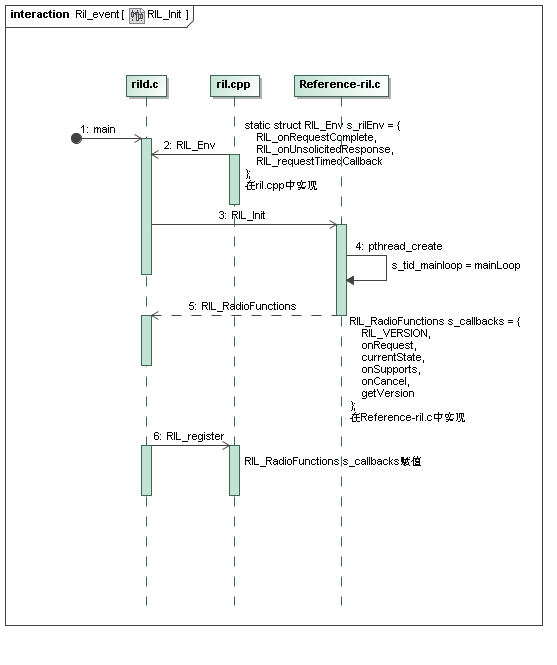
由于各手机厂商的AT指令差异,因此与modem交互层需要各手机厂商实现,以动态库的形式提供。作为介于modem与上层的中间层,即要与底层交互也要与上层通信,因此就需要定义一个接口来衔接RILD与动态库,RIL_Env和RIL_RadioFunctions接口就是libril.so与librefrence.so通信的桥梁。是Rild架构中用于隔离通用代码和厂商代码的接口,RIL_Env由通用代码实现,而RIL_RadioFunctions则是由厂商代码实现。
RIL_Init的主要任务:
1. 向librefrence.so注册libril.so提供的接口RIL_Env;
2. 创建一个mainLoop工作线程,用于初始化AT模块,并监控AT模块的状态,一旦AT被关闭,则重新打开并初始化AT;
3. 当AT被打开后,mainLoop工作线程将向Rild提交一个定时事件,并触发eventLoop来完成对modem的初始化;
4. 创建一个readLoop工作线程,用于从AT串口中读取数据;
5.返回librefrence.so提供的接口RIL_RadioFunctions;
hardware\ril\reference-ril\reference-ril.c
- const RIL_RadioFunctions *RIL_Init(const struct RIL_Env *env, int argc, charchar **argv)
- {
- int ret;
- int fd = -1;
- int opt;
- pthread_attr_t attr;
- s_rilenv = env; //将ril.cpp中定义的RIL_Env注册到reference-ril.c中的s_rilenv
- while ( -1 != (opt = getopt(argc, argv, "p:d:s:"))) {
- switch (opt) {
- case 'p':
- s_port = atoi(optarg);
- if (s_port == 0) {
- usage(argv[0]);
- return NULL;
- }
- LOGI("Opening loopback port %d\n", s_port);
- break;
- case 'd':
- s_device_path = optarg;
- LOGI("Opening tty device %s\n", s_device_path);
- break;
- case 's':
- s_device_path = optarg;
- s_device_socket = 1;
- LOGI("Opening socket %s\n", s_device_path);
- break;
- default:
- usage(argv[0]);
- return NULL;
- }
- }
- if (s_port < 0 && s_device_path == NULL) {
- usage(argv[0]);
- return NULL;
- }
- pthread_attr_init (&attr);
- pthread_attr_setdetachstate(&attr, PTHREAD_CREATE_DETACHED);
- //创建一个mainLoop线程
- ret = pthread_create(&s_tid_mainloop, &attr, mainLoop, NULL);
- //将reference-ril.c中定义的RIL_RadioFunctions返回并注册到ril.cpp中的s_callbacks
- return &s_callbacks;
- }
const RIL_RadioFunctions *RIL_Init(const struct RIL_Env *env, int argc, char **argv)
{int ret;int fd = -1;int opt;pthread_attr_t attr;s_rilenv = env; //将ril.cpp中定义的RIL_Env注册到reference-ril.c中的s_rilenvwhile ( -1 != (opt = getopt(argc, argv, "p:d:s:"))) {switch (opt) {case 'p':s_port = atoi(optarg);if (s_port == 0) {usage(argv[0]);return NULL;}LOGI("Opening loopback port %d\n", s_port);break;case 'd':s_device_path = optarg;LOGI("Opening tty device %s\n", s_device_path);break;case 's':s_device_path = optarg;s_device_socket = 1;LOGI("Opening socket %s\n", s_device_path);break;default:usage(argv[0]);return NULL;}}if (s_port < 0 && s_device_path == NULL) {usage(argv[0]);return NULL;}pthread_attr_init (&attr);pthread_attr_setdetachstate(&attr, PTHREAD_CREATE_DETACHED);//创建一个mainLoop线程ret = pthread_create(&s_tid_mainloop, &attr, mainLoop, NULL);//将reference-ril.c中定义的RIL_RadioFunctions返回并注册到ril.cpp中的s_callbacksreturn &s_callbacks;
}- static voidvoid * mainLoop(voidvoid *param)
- {
- int fd;
- int ret;
- AT_DUMP("== ", "entering mainLoop()", -1 );
- //为AT模块设置回调函数
- at_set_on_reader_closed(onATReaderClosed);
- at_set_on_timeout(onATTimeout);
- for (;;) {
- fd = -1;
- while (fd < 0) { //获得串口AT模块的设备文件描述符
- if (s_port > 0) {
- fd = socket_loopback_client(s_port, SOCK_STREAM);
- } else if (s_device_socket) {
- if (!strcmp(s_device_path, "/dev/socket/qemud")) {
- /* Qemu-specific control socket */
- fd = socket_local_client( "qemud",
- ANDROID_SOCKET_NAMESPACE_RESERVED,SOCK_STREAM );
- if (fd >= 0 ) {
- char answer[2];
- if ( write(fd, "gsm", 3) != 3 ||read(fd, answer, 2) != 2 ||
- memcmp(answer, "OK", 2) != 0)
- {
- close(fd);
- fd = -1;
- }
- }
- }
- else
- fd = socket_local_client( s_device_path, ANDROID_SOCKET_NAMESPACE_FILESYSTEM,SOCK_STREAM );
- } else if (s_device_path != NULL) {
- fd = open (s_device_path, O_RDWR);
- if ( fd >= 0 && !memcmp( s_device_path, "/dev/ttyS", 9 ) ) {
- /* disable echo on serial ports */
- struct termios ios;
- tcgetattr( fd, &ios );
- ios.c_lflag = 0; /* disable ECHO, ICANON, etc... */
- tcsetattr( fd, TCSANOW, &ios );
- }
- }
- if (fd < 0) {
- perror ("opening AT interface. retrying...");
- sleep(10);
- }
- }
- s_closed = 0;
- //打开AT模块,创建AT读取线程s_tid_reader,fd为modem设备文件句柄
- ret = at_open(fd, onUnsolicited);
- if (ret < 0) {
- LOGE ("AT error %d on at_open\n", ret);
- return 0;
- }
- //向Rild提交超时任务
- RIL_requestTimedCallback(initializeCallback, NULL, &TIMEVAL_0);
- sleep(1);
- //如果AT模块被关闭,则waitForClose返回,重新打开AT,如果AT已打开,则阻塞
- waitForClose();
- LOGI("Re-opening after close");
- }
- }
static void * mainLoop(void *param)
{int fd;int ret;AT_DUMP("== ", "entering mainLoop()", -1 );//为AT模块设置回调函数at_set_on_reader_closed(onATReaderClosed);at_set_on_timeout(onATTimeout);for (;;) {fd = -1;while (fd < 0) { //获得串口AT模块的设备文件描述符if (s_port > 0) {fd = socket_loopback_client(s_port, SOCK_STREAM);} else if (s_device_socket) {if (!strcmp(s_device_path, "/dev/socket/qemud")) {/* Qemu-specific control socket */fd = socket_local_client( "qemud",ANDROID_SOCKET_NAMESPACE_RESERVED,SOCK_STREAM );if (fd >= 0 ) {char answer[2];if ( write(fd, "gsm", 3) != 3 ||read(fd, answer, 2) != 2 ||memcmp(answer, "OK", 2) != 0){close(fd);fd = -1;}}}elsefd = socket_local_client( s_device_path, ANDROID_SOCKET_NAMESPACE_FILESYSTEM,SOCK_STREAM );} else if (s_device_path != NULL) {fd = open (s_device_path, O_RDWR);if ( fd >= 0 && !memcmp( s_device_path, "/dev/ttyS", 9 ) ) {/* disable echo on serial ports */struct termios ios;tcgetattr( fd, &ios );ios.c_lflag = 0; /* disable ECHO, ICANON, etc... */tcsetattr( fd, TCSANOW, &ios );}}if (fd < 0) {perror ("opening AT interface. retrying...");sleep(10);}}s_closed = 0;//打开AT模块,创建AT读取线程s_tid_reader,fd为modem设备文件句柄ret = at_open(fd, onUnsolicited);if (ret < 0) {LOGE ("AT error %d on at_open\n", ret);return 0;}//向Rild提交超时任务RIL_requestTimedCallback(initializeCallback, NULL, &TIMEVAL_0);sleep(1);//如果AT模块被关闭,则waitForClose返回,重新打开AT,如果AT已打开,则阻塞waitForClose();LOGI("Re-opening after close");}
}通过at_open打开文件描述符为fd的AT串口设备,并注册回调函数ATUnsolHandler
- int at_open(int fd, ATUnsolHandler h)
- {
- int ret;
- pthread_t tid;
- pthread_attr_t attr;
- s_fd = fd;
- s_unsolHandler = h;
- s_readerClosed = 0;
- s_responsePrefix = NULL;
- s_smsPDU = NULL;
- sp_response = NULL;
- /* Android power control ioctl */
- #ifdef HAVE_ANDROID_OS
- #ifdef OMAP_CSMI_POWER_CONTROL
- ret = ioctl(fd, OMAP_CSMI_TTY_ENABLE_ACK);
- if(ret == 0) {
- int ack_count;
- int read_count;
- int old_flags;
- char sync_buf[256];
- old_flags = fcntl(fd, F_GETFL, 0);
- fcntl(fd, F_SETFL, old_flags | O_NONBLOCK);
- do {
- ioctl(fd, OMAP_CSMI_TTY_READ_UNACKED, &ack_count);
- read_count = 0;
- do {
- ret = read(fd, sync_buf, sizeof(sync_buf));
- if(ret > 0)
- read_count += ret;
- } while(ret > 0 || (ret < 0 && errno == EINTR));
- ioctl(fd, OMAP_CSMI_TTY_ACK, &ack_count);
- } while(ack_count > 0 || read_count > 0);
- fcntl(fd, F_SETFL, old_flags);
- s_readCount = 0;
- s_ackPowerIoctl = 1;
- }
- else
- s_ackPowerIoctl = 0;
- #else // OMAP_CSMI_POWER_CONTROL
- s_ackPowerIoctl = 0;
- #endif // OMAP_CSMI_POWER_CONTROL
- #endif /*HAVE_ANDROID_OS*/
- pthread_attr_init (&attr);
- pthread_attr_setdetachstate(&attr, PTHREAD_CREATE_DETACHED);
- //创建readerLoop工作线程,该线程用于从串口读取数据
- ret = pthread_create(&s_tid_reader, &attr, readerLoop, &attr);
- if (ret < 0) {
- perror ("pthread_create");
- return -1;
- }
- return 0;
- }
int at_open(int fd, ATUnsolHandler h)
{int ret;pthread_t tid;pthread_attr_t attr;s_fd = fd;s_unsolHandler = h;s_readerClosed = 0;s_responsePrefix = NULL;s_smsPDU = NULL;sp_response = NULL;/* Android power control ioctl */
#ifdef HAVE_ANDROID_OS
#ifdef OMAP_CSMI_POWER_CONTROLret = ioctl(fd, OMAP_CSMI_TTY_ENABLE_ACK);if(ret == 0) {int ack_count;int read_count;int old_flags;char sync_buf[256];old_flags = fcntl(fd, F_GETFL, 0);fcntl(fd, F_SETFL, old_flags | O_NONBLOCK);do {ioctl(fd, OMAP_CSMI_TTY_READ_UNACKED, &ack_count);read_count = 0;do {ret = read(fd, sync_buf, sizeof(sync_buf));if(ret > 0)read_count += ret;} while(ret > 0 || (ret < 0 && errno == EINTR));ioctl(fd, OMAP_CSMI_TTY_ACK, &ack_count);} while(ack_count > 0 || read_count > 0);fcntl(fd, F_SETFL, old_flags);s_readCount = 0;s_ackPowerIoctl = 1;}elses_ackPowerIoctl = 0;
#else // OMAP_CSMI_POWER_CONTROLs_ackPowerIoctl = 0;
#endif // OMAP_CSMI_POWER_CONTROL
#endif /*HAVE_ANDROID_OS*/pthread_attr_init (&attr);pthread_attr_setdetachstate(&attr, PTHREAD_CREATE_DETACHED);//创建readerLoop工作线程,该线程用于从串口读取数据ret = pthread_create(&s_tid_reader, &attr, readerLoop, &attr);if (ret < 0) {perror ("pthread_create");return -1;}return 0;
}- RIL_requestTimedCallback(initializeCallback, NULL, &TIMEVAL_0);
- #define RIL_requestTimedCallback(a,b,c) s_rilenv->RequestTimedCallback(a,b,c)
RIL_requestTimedCallback(initializeCallback, NULL, &TIMEVAL_0);#define RIL_requestTimedCallback(a,b,c) s_rilenv->RequestTimedCallback(a,b,c)3.readLoop工作线程
Read loop 解析从Modem 发过来的回应。如果遇到URC 则通过handleUnsolicited 上报的RIL_JAVA。如果是命令的应答,则通过handleFinalResponse 通知send_at_command 有应答结果。
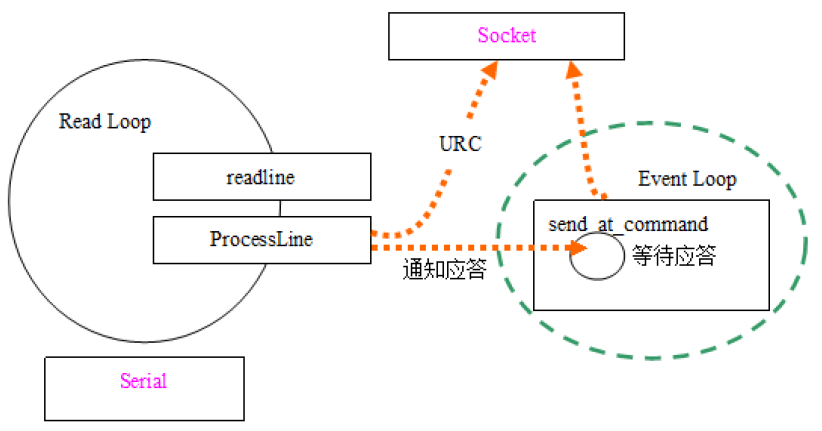
注册RIL_RadioFunctions接口
hardware\ril\libril\ril.cpp
- extern "C" void RIL_register (const RIL_RadioFunctions *callbacks) {
- int ret;
- int flags;
- //版本验证
- if (callbacks == NULL || ((callbacks->version != RIL_VERSION)&& (callbacks->version < 2))) {
- return;
- }
- if (callbacks->version < RIL_VERSION) {
- LOGE ("RIL_register: upgrade RIL to version %d current version=%d",
- RIL_VERSION, callbacks->version);
- }
- if (s_registerCalled > 0) {
- LOGE("RIL_register has been called more than once. "Subsequent call ignored");
- return;
- }
- //将reference-ril.c中定义的RIL_RadioFunctions注册到ril.cpp中
- memcpy(&s_callbacks, callbacks, sizeof (RIL_RadioFunctions));
- s_registerCalled = 1;
- for (int i = 0; i < (int)NUM_ELEMS(s_commands); i++) {
- assert(i == s_commands[i].requestNumber); //序号验证
- }
- for (int i = 0; i < (int)NUM_ELEMS(s_unsolResponses); i++) {
- assert(i + RIL_UNSOL_RESPONSE_BASE== s_unsolResponses[i].requestNumber);
- }
- // old standalone impl wants it here.
- if (s_started == 0) {
- RIL_startEventLoop();
- }
- // 得到名为rild的socket句柄
- s_fdListen = android_get_control_socket(SOCKET_NAME_RIL);
- if (s_fdListen < 0) {
- LOGE("Failed to get socket '" SOCKET_NAME_RIL "'");
- exit(-1);
- }
- // 监听该socket
- ret = listen(s_fdListen, 4);
- if (ret < 0) {
- LOGE("Failed to listen on control socket '%d': %s",s_fdListen, strerror(errno));
- exit(-1);
- }
- /* 设置s_listen_event事件,一旦有客户端连接,即s_fdListen可读就会导致eventLoop工作线程中的select返回,因为该事件不是持久的,因此调用为listenCallback处理完后,将从watch_table移除该事件,所以Rild只支持一个客户端连接*/
- ril_event_set (&s_listen_event, s_fdListen, false,listenCallback, NULL);
- /* 添加s_listen_event事件,并触发eventLoop工作线程 */
- rilEventAddWakeup (&s_listen_event);
- #if 1
- // 得到调试socket的句柄rild-debug
- s_fdDebug = android_get_control_socket(SOCKET_NAME_RIL_DEBUG);
- if (s_fdDebug < 0) {
- LOGE("Failed to get socket '" SOCKET_NAME_RIL_DEBUG "' errno:%d", errno);
- exit(-1);
- }
- //监听该socket
- ret = listen(s_fdDebug, 4);
- if (ret < 0) {
- LOGE("Failed to listen on ril debug socket '%d': %s",s_fdDebug, strerror(errno));
- exit(-1);
- }
- /* 设置s_debug_event事件 */
- ril_event_set (&s_debug_event, s_fdDebug, true,debugCallback, NULL);
- /* 添加s_debug_event事件,并触发eventLoop工作线程 */
- rilEventAddWakeup (&s_debug_event);
- #endif
- }
extern "C" void RIL_register (const RIL_RadioFunctions *callbacks) {int ret;int flags;//版本验证if (callbacks == NULL || ((callbacks->version != RIL_VERSION)&& (callbacks->version < 2))) { return;}if (callbacks->version < RIL_VERSION) {LOGE ("RIL_register: upgrade RIL to version %d current version=%d",RIL_VERSION, callbacks->version);}if (s_registerCalled > 0) {LOGE("RIL_register has been called more than once. "Subsequent call ignored");return;}//将reference-ril.c中定义的RIL_RadioFunctions注册到ril.cpp中memcpy(&s_callbacks, callbacks, sizeof (RIL_RadioFunctions));s_registerCalled = 1;for (int i = 0; i < (int)NUM_ELEMS(s_commands); i++) {assert(i == s_commands[i].requestNumber); //序号验证}for (int i = 0; i < (int)NUM_ELEMS(s_unsolResponses); i++) {assert(i + RIL_UNSOL_RESPONSE_BASE== s_unsolResponses[i].requestNumber);}// old standalone impl wants it here.if (s_started == 0) {RIL_startEventLoop();}// 得到名为rild的socket句柄s_fdListen = android_get_control_socket(SOCKET_NAME_RIL);if (s_fdListen < 0) {LOGE("Failed to get socket '" SOCKET_NAME_RIL "'");exit(-1);}// 监听该socketret = listen(s_fdListen, 4);if (ret < 0) {LOGE("Failed to listen on control socket '%d': %s",s_fdListen, strerror(errno));exit(-1);}/* 设置s_listen_event事件,一旦有客户端连接,即s_fdListen可读就会导致eventLoop工作线程中的select返回,因为该事件不是持久的,因此调用为listenCallback处理完后,将从watch_table移除该事件,所以Rild只支持一个客户端连接*/ril_event_set (&s_listen_event, s_fdListen, false,listenCallback, NULL);/* 添加s_listen_event事件,并触发eventLoop工作线程 */rilEventAddWakeup (&s_listen_event);
#if 1// 得到调试socket的句柄rild-debugs_fdDebug = android_get_control_socket(SOCKET_NAME_RIL_DEBUG);if (s_fdDebug < 0) {LOGE("Failed to get socket '" SOCKET_NAME_RIL_DEBUG "' errno:%d", errno);exit(-1);}//监听该socketret = listen(s_fdDebug, 4);if (ret < 0) {LOGE("Failed to listen on ril debug socket '%d': %s",s_fdDebug, strerror(errno));exit(-1);}/* 设置s_debug_event事件 */ril_event_set (&s_debug_event, s_fdDebug, true,debugCallback, NULL);/* 添加s_debug_event事件,并触发eventLoop工作线程 */rilEventAddWakeup (&s_debug_event);
#endif
}1.客户端连接处理
s_listen_event事件用于处理上层客户端的socket连接,当得到socket连接请求时,eventLoop工作线程里的select返回并自动调用listenCallback回调函数进行处理:
- tatic void listenCallback (int fd, short flags, void *param) {
- int ret;
- int err;
- int is_phone_socket;
- RecordStream *p_rs;
- commthread_data_t *user_data = NULL;
- user_data =(commthread_data_t *)malloc(sizeof(commthread_data_t));
- struct sockaddr_un peeraddr;
- socklen_t socklen = sizeof (peeraddr);
- struct ucred creds;
- socklen_t szCreds = sizeof(creds);
- struct passwd *pwd = NULL;
- assert (s_fdCommand < 0);
- assert (fd == s_fdListen);
- //接收一个客户端的连接,并将该socket连接保存在变量s_fdCommand中
- s_fdCommand = accept(s_fdListen, (sockaddr *) &peeraddr, &socklen);
- if (s_fdCommand < 0 ) {
- LOGE("Error on accept() errno:%d", errno);
- /* start listening for new connections again */
- rilEventAddWakeup(&s_listen_event);
- return;
- }
- /* 对客户端权限判断,判断是否是进程组ID为radio的进程发起的连接*/
- errno = 0;
- is_phone_socket = 0;
- err = getsockopt(s_fdCommand, SOL_SOCKET, SO_PEERCRED, &creds, &szCreds);
- if (err == 0 && szCreds > 0) {
- errno = 0;
- pwd = getpwuid(creds.uid);
- if (pwd != NULL) {
- if (strcmp(pwd->pw_name, PHONE_PROCESS) == 0) {
- is_phone_socket = 1;
- } else {
- LOGE("RILD can't accept socket from process %s", pwd->pw_name);
- }
- } else {
- LOGE("Error on getpwuid() errno: %d", errno);
- }
- } else {
- LOGD("Error on getsockopt() errno: %d", errno);
- }
- if ( !is_phone_socket ) {
- LOGE("RILD must accept socket from %s", PHONE_PROCESS);
- close(s_fdCommand);
- s_fdCommand = -1;
- onCommandsSocketClosed();
- /* start listening for new connections again */
- rilEventAddWakeup(&s_listen_event);
- return;
- }
- #if 0
- if(s_dualSimMode) {
- if(s_sim_num == 0) {
- property_get(SIM_POWER_PROPERTY, prop, "0");
- if(!strcmp(prop, "0")) {
- property_set(SIM_POWER_PROPERTY, "1");
- s_callbacks.powerSIM(NULL);
- }
- } else if(s_sim_num == 1) {
- property_get(SIM_POWER_PROPERTY1, prop, "0");
- if(!strcmp(prop, "0")) {
- property_set(SIM_POWER_PROPERTY1, "1");
- s_callbacks.powerSIM(NULL);
- }
- }
- } else {
- property_get(SIM_POWER_PROPERTY, prop, "0");
- if(!strcmp(prop, "0")) {
- property_set(SIM_POWER_PROPERTY, "1");
- s_callbacks.powerSIM(NULL);
- }
- }
- #endif
- //p_rs为RecordStream类型,它内部会分配一个缓冲区来存储客户端发送过来的数据
- p_rs = record_stream_new(s_fdCommand, MAX_COMMAND_BYTES);
- //添加一个针对接收到的客户端连接的处理事件,从而在eventLoop工作线程中处理该客户端的各种请求
- ril_event_set (&s_commands_event, s_fdCommand, 1,processCommandsCallback, p_rs);
- rilEventAddWakeup (&s_commands_event);
- onNewCommandConnect();
- }
tatic void listenCallback (int fd, short flags, void *param) {int ret;int err;int is_phone_socket;RecordStream *p_rs;commthread_data_t *user_data = NULL;user_data =(commthread_data_t *)malloc(sizeof(commthread_data_t));struct sockaddr_un peeraddr;socklen_t socklen = sizeof (peeraddr);struct ucred creds;socklen_t szCreds = sizeof(creds);struct passwd *pwd = NULL;assert (s_fdCommand < 0);assert (fd == s_fdListen);//接收一个客户端的连接,并将该socket连接保存在变量s_fdCommand中s_fdCommand = accept(s_fdListen, (sockaddr *) &peeraddr, &socklen);if (s_fdCommand < 0 ) {LOGE("Error on accept() errno:%d", errno);/* start listening for new connections again */rilEventAddWakeup(&s_listen_event);return;}/* 对客户端权限判断,判断是否是进程组ID为radio的进程发起的连接*/errno = 0;is_phone_socket = 0;err = getsockopt(s_fdCommand, SOL_SOCKET, SO_PEERCRED, &creds, &szCreds);if (err == 0 && szCreds > 0) {errno = 0;pwd = getpwuid(creds.uid);if (pwd != NULL) {if (strcmp(pwd->pw_name, PHONE_PROCESS) == 0) {is_phone_socket = 1;} else {LOGE("RILD can't accept socket from process %s", pwd->pw_name);}} else {LOGE("Error on getpwuid() errno: %d", errno);}} else {LOGD("Error on getsockopt() errno: %d", errno);}if ( !is_phone_socket ) {LOGE("RILD must accept socket from %s", PHONE_PROCESS);close(s_fdCommand);s_fdCommand = -1;onCommandsSocketClosed();/* start listening for new connections again */rilEventAddWakeup(&s_listen_event);return;}
#if 0if(s_dualSimMode) {if(s_sim_num == 0) {property_get(SIM_POWER_PROPERTY, prop, "0");if(!strcmp(prop, "0")) {property_set(SIM_POWER_PROPERTY, "1");s_callbacks.powerSIM(NULL);}} else if(s_sim_num == 1) {property_get(SIM_POWER_PROPERTY1, prop, "0");if(!strcmp(prop, "0")) {property_set(SIM_POWER_PROPERTY1, "1");s_callbacks.powerSIM(NULL);}}} else {property_get(SIM_POWER_PROPERTY, prop, "0");if(!strcmp(prop, "0")) {property_set(SIM_POWER_PROPERTY, "1");s_callbacks.powerSIM(NULL);}}
#endif//p_rs为RecordStream类型,它内部会分配一个缓冲区来存储客户端发送过来的数据p_rs = record_stream_new(s_fdCommand, MAX_COMMAND_BYTES);//添加一个针对接收到的客户端连接的处理事件,从而在eventLoop工作线程中处理该客户端的各种请求ril_event_set (&s_commands_event, s_fdCommand, 1,processCommandsCallback, p_rs);rilEventAddWakeup (&s_commands_event);onNewCommandConnect();
}在listenCallback中首先接收客户端的连接请求,并验证客户端的权限,同时将该客户端以事件的形式添加到eventLoop工作线程中进行监控,当该客户端有数据请求时,eventLoop工作线程从select中返回,并自动调用processCommandsCallback回调函数:
- static void processCommandsCallback(int fd, short flags, void *param) {
- RecordStream *p_rs;
- void *p_record;
- size_t recordlen;
- int ret;
- assert(fd == s_fdCommand);
- p_rs = (RecordStream *)param;
- for (;;) { //循环处理客户端发送过来的AT命令
- //读取一条AT命令
- ret = record_stream_get_next(p_rs, &p_record, &recordlen);
- if (ret == 0 && p_record == NULL) {
- break;
- } else if (ret < 0) {
- break;
- } else if (ret == 0) { /* && p_record != NULL */
- //处理客户端发送过来的AT命令
- processCommandBuffer(p_record, recordlen);
- }
- }
- if (ret == 0 || !(errno == EAGAIN || errno == EINTR)) {
- if (ret != 0) {
- LOGE("error on reading command socket errno:%d\n", errno);
- } else {
- LOGW("EOS. Closing command socket.");
- }
- close(s_fdCommand);
- s_fdCommand = -1;
- ril_event_del(&s_commands_event);
- record_stream_free(p_rs);
- rilEventAddWakeup(&s_listen_event);
- onCommandsSocketClosed();
- }
- }
static void processCommandsCallback(int fd, short flags, void *param) {RecordStream *p_rs;void *p_record;size_t recordlen;int ret;assert(fd == s_fdCommand);p_rs = (RecordStream *)param;for (;;) { //循环处理客户端发送过来的AT命令//读取一条AT命令ret = record_stream_get_next(p_rs, &p_record, &recordlen);if (ret == 0 && p_record == NULL) {break;} else if (ret < 0) {break;} else if (ret == 0) { /* && p_record != NULL *///处理客户端发送过来的AT命令processCommandBuffer(p_record, recordlen);}}if (ret == 0 || !(errno == EAGAIN || errno == EINTR)) {if (ret != 0) {LOGE("error on reading command socket errno:%d\n", errno);} else {LOGW("EOS. Closing command socket.");}close(s_fdCommand);s_fdCommand = -1;ril_event_del(&s_commands_event);record_stream_free(p_rs);rilEventAddWakeup(&s_listen_event);onCommandsSocketClosed();}
}- static int processCommandBuffer(void *buffer, size_t buflen) {
- Parcel p;
- status_t status;
- int32_t request;
- int32_t token;
- RequestInfo *pRI;
- int ret;
- p.setData((uint8_t *) buffer, buflen);
- // status checked at end
- status = p.readInt32(&request);
- status = p.readInt32 (&token);
- if (status != NO_ERROR) {
- LOGE("invalid request block");
- return 0;
- }
- if (request < 1 || request >= (int32_t)NUM_ELEMS(s_commands)) {
- LOGE("unsupported request code %d token %d", request, token);
- return 0;
- }
- pRI = (RequestInfo *)calloc(1, sizeof(RequestInfo));
- pRI->token = token; //AT命令标号
- pRI->pCI = &(s_commands[request]); //根据request找到s_commands命令数组中的指定AT命令
- ret = pthread_mutex_lock(&s_pendingRequestsMutex);
- assert (ret == 0);
- pRI->p_next = s_pendingRequests;
- s_pendingRequests = pRI;
- ret = pthread_mutex_unlock(&s_pendingRequestsMutex);
- assert (ret == 0);
- //调用指定AT命令的dispatch函数,根据接收来自客户进程的命令和参数,调用onRequest进行处理。
- pRI->pCI->dispatchFunction(p, pRI);
- return 0;
- }
static int processCommandBuffer(void *buffer, size_t buflen) {Parcel p;status_t status;int32_t request;int32_t token;RequestInfo *pRI;int ret;p.setData((uint8_t *) buffer, buflen);// status checked at endstatus = p.readInt32(&request);status = p.readInt32 (&token);if (status != NO_ERROR) {LOGE("invalid request block");return 0;}if (request < 1 || request >= (int32_t)NUM_ELEMS(s_commands)) {LOGE("unsupported request code %d token %d", request, token);return 0;}pRI = (RequestInfo *)calloc(1, sizeof(RequestInfo));pRI->token = token; //AT命令标号pRI->pCI = &(s_commands[request]); //根据request找到s_commands命令数组中的指定AT命令ret = pthread_mutex_lock(&s_pendingRequestsMutex);assert (ret == 0);pRI->p_next = s_pendingRequests;s_pendingRequests = pRI;ret = pthread_mutex_unlock(&s_pendingRequestsMutex);assert (ret == 0);//调用指定AT命令的dispatch函数,根据接收来自客户进程的命令和参数,调用onRequest进行处理。pRI->pCI->dispatchFunction(p, pRI);return 0;
}发短信的AT命令:{RIL_REQUEST_SEND_SMS, dispatchStrings, responseSMS},
3.电话拨打流程
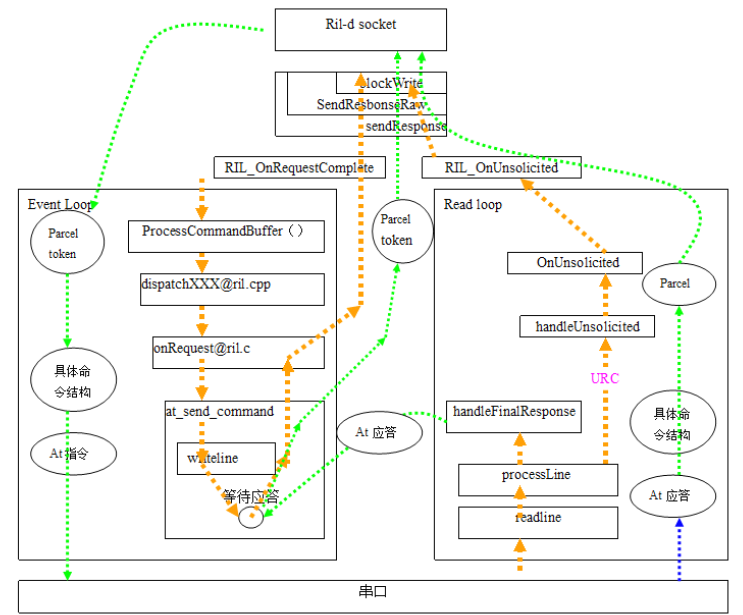
- static void dispatchDial (Parcel &p, RequestInfo *pRI) {
- RIL_Dial dial; //RIL_Dial存储了打电话的所有信息
- RIL_UUS_Info uusInfo;
- int32_t sizeOfDial;
- int32_t t;
- .................. //初始化dial变量
- s_callbacks.onRequest(pRI->pCI->requestNumber, &dial, sizeOfDial, pRI);
- .................
- return;
- }
static void dispatchDial (Parcel &p, RequestInfo *pRI) {RIL_Dial dial; //RIL_Dial存储了打电话的所有信息RIL_UUS_Info uusInfo; int32_t sizeOfDial;int32_t t;.................. //初始化dial变量 s_callbacks.onRequest(pRI->pCI->requestNumber, &dial, sizeOfDial, pRI);.................return;
}- static void onRequest (int request, void *data, size_t datalen, RIL_Token t)
- {
- switch (request) {
- case RIL_REQUEST_DIAL:
- requestDial(data, datalen, t);
- break;
- }
- }
static void onRequest (int request, void *data, size_t datalen, RIL_Token t)
{switch (request) {case RIL_REQUEST_DIAL:requestDial(data, datalen, t);break;}
}- static void requestDial(void *data, size_t datalen, RIL_Token t)
- {
- RIL_Dial *p_dial;
- char *cmd;
- const char *clir;
- int ret;
- p_dial = (RIL_Dial *)data;
- switch (p_dial->clir) {
- case 1: clir = "I"; break; /*invocation*/
- case 2: clir = "i"; break; /*suppression*/
- default:
- case 0: clir = ""; break; /*subscription default*/
- }
- //向串口发送AT指令
- ret = at_send_command(cmd, NULL);
- free(cmd);
- //通知请求结果
- RIL_onRequestComplete(t, RIL_E_SUCCESS, NULL, 0);
- }
static void requestDial(void *data, size_t datalen, RIL_Token t)
{RIL_Dial *p_dial;char *cmd;const char *clir;int ret;p_dial = (RIL_Dial *)data;switch (p_dial->clir) {case 1: clir = "I"; break; /*invocation*/case 2: clir = "i"; break; /*suppression*/default:case 0: clir = ""; break; /*subscription default*/}//向串口发送AT指令ret = at_send_command(cmd, NULL);free(cmd);//通知请求结果RIL_onRequestComplete(t, RIL_E_SUCCESS, NULL, 0);
}- extern "C" void RIL_onRequestComplete(RIL_Token t, RIL_Errno e, void *response, size_t responselen) {
- RequestInfo *pRI;
- int ret;
- size_t errorOffset;
- pRI = (RequestInfo *)t;
- //该请求已经处理,需要从请求队列中移除该请求
- if (!checkAndDequeueRequestInfo(pRI)) {
- LOGE ("RIL_onRequestComplete: invalid RIL_Token");
- return;
- }
- if (pRI->local > 0) {
- ...........
- sendResponse(p);
- }
- done:
- free(pRI);
- }
extern "C" void RIL_onRequestComplete(RIL_Token t, RIL_Errno e, void *response, size_t responselen) {RequestInfo *pRI;int ret;size_t errorOffset;pRI = (RequestInfo *)t;//该请求已经处理,需要从请求队列中移除该请求if (!checkAndDequeueRequestInfo(pRI)) {LOGE ("RIL_onRequestComplete: invalid RIL_Token");return;}if (pRI->local > 0) {...........sendResponse(p);}
done:free(pRI);
}- static int sendResponse (Parcel &p) {
- return sendResponseRaw(p.data(), p.dataSize()); //将结果发送给JAVA RIL客户端
- }
static int sendResponse (Parcel &p) {return sendResponseRaw(p.data(), p.dataSize()); //将结果发送给JAVA RIL客户端
}- static int sendResponseRaw (const void *data, size_t dataSize) {
- int fd = s_fdCommand;
- int ret;
- uint32_t header;
- if (s_fdCommand < 0) {
- return -1;
- }
- if (dataSize > MAX_COMMAND_BYTES) {
- return -1;
- }
- pthread_mutex_lock(&s_writeMutex);
- header = htonl(dataSize);
- ret = blockingWrite(fd, (void *)&header, sizeof(header));
- if (ret < 0) {
- pthread_mutex_unlock(&s_writeMutex);
- return ret;
- }
- ret = blockingWrite(fd, data, dataSize);
- if (ret < 0) {
- pthread_mutex_unlock(&s_writeMutex);
- return ret;
- }
- pthread_mutex_unlock(&s_writeMutex);
- return 0;
- }
static int sendResponseRaw (const void *data, size_t dataSize) {int fd = s_fdCommand;int ret;uint32_t header;if (s_fdCommand < 0) {return -1;}if (dataSize > MAX_COMMAND_BYTES) {return -1;}pthread_mutex_lock(&s_writeMutex);header = htonl(dataSize);ret = blockingWrite(fd, (void *)&header, sizeof(header));if (ret < 0) {pthread_mutex_unlock(&s_writeMutex);return ret;}ret = blockingWrite(fd, data, dataSize);if (ret < 0) {pthread_mutex_unlock(&s_writeMutex);return ret;}pthread_mutex_unlock(&s_writeMutex);return 0;
}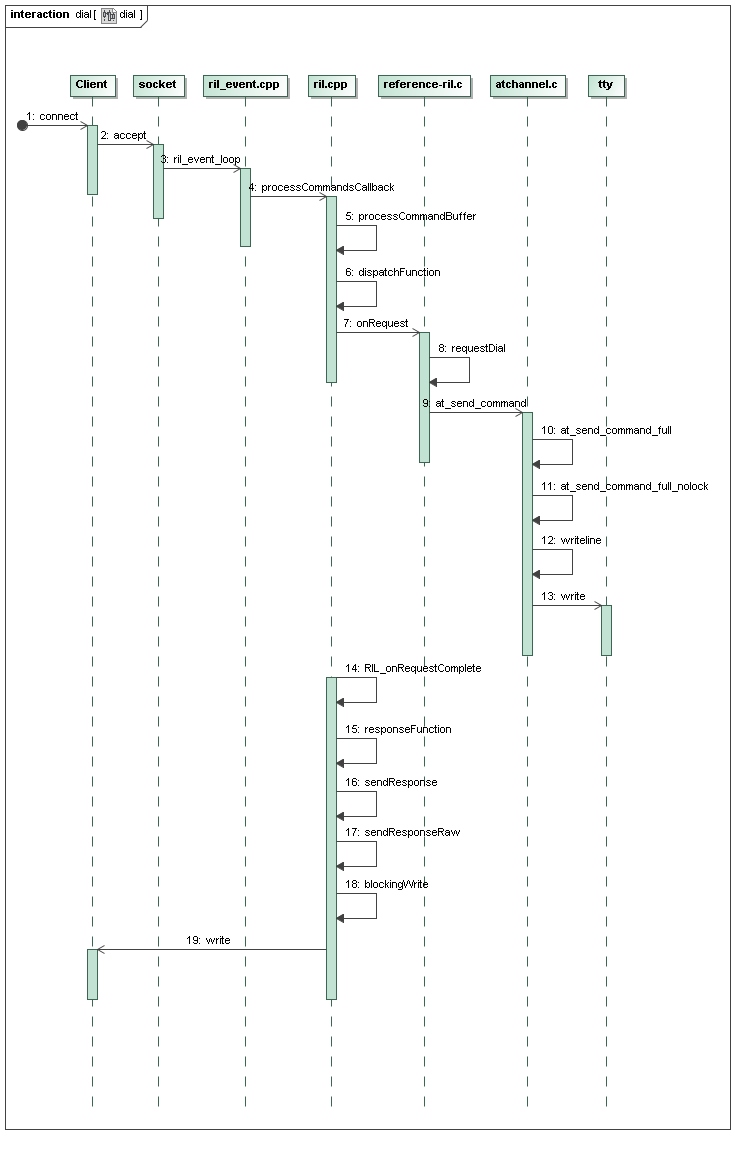
Rild通过onRequest向动态库提交一个请求,然后返回,动态库处理完请求后,处理结果通过回调接口通知客户端
这篇关于RIL 机制源码分析的文章就介绍到这儿,希望我们推荐的文章对编程师们有所帮助!
